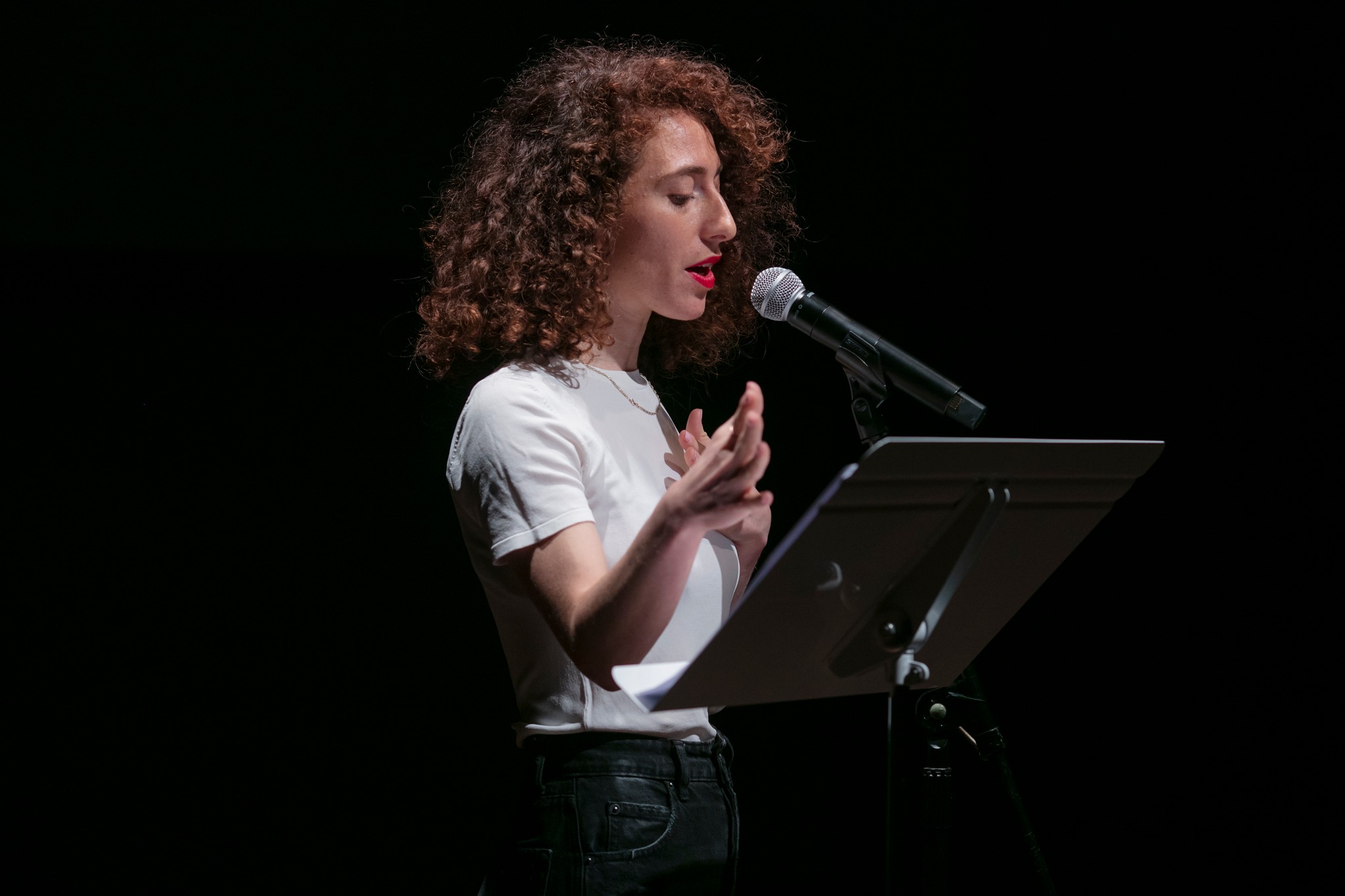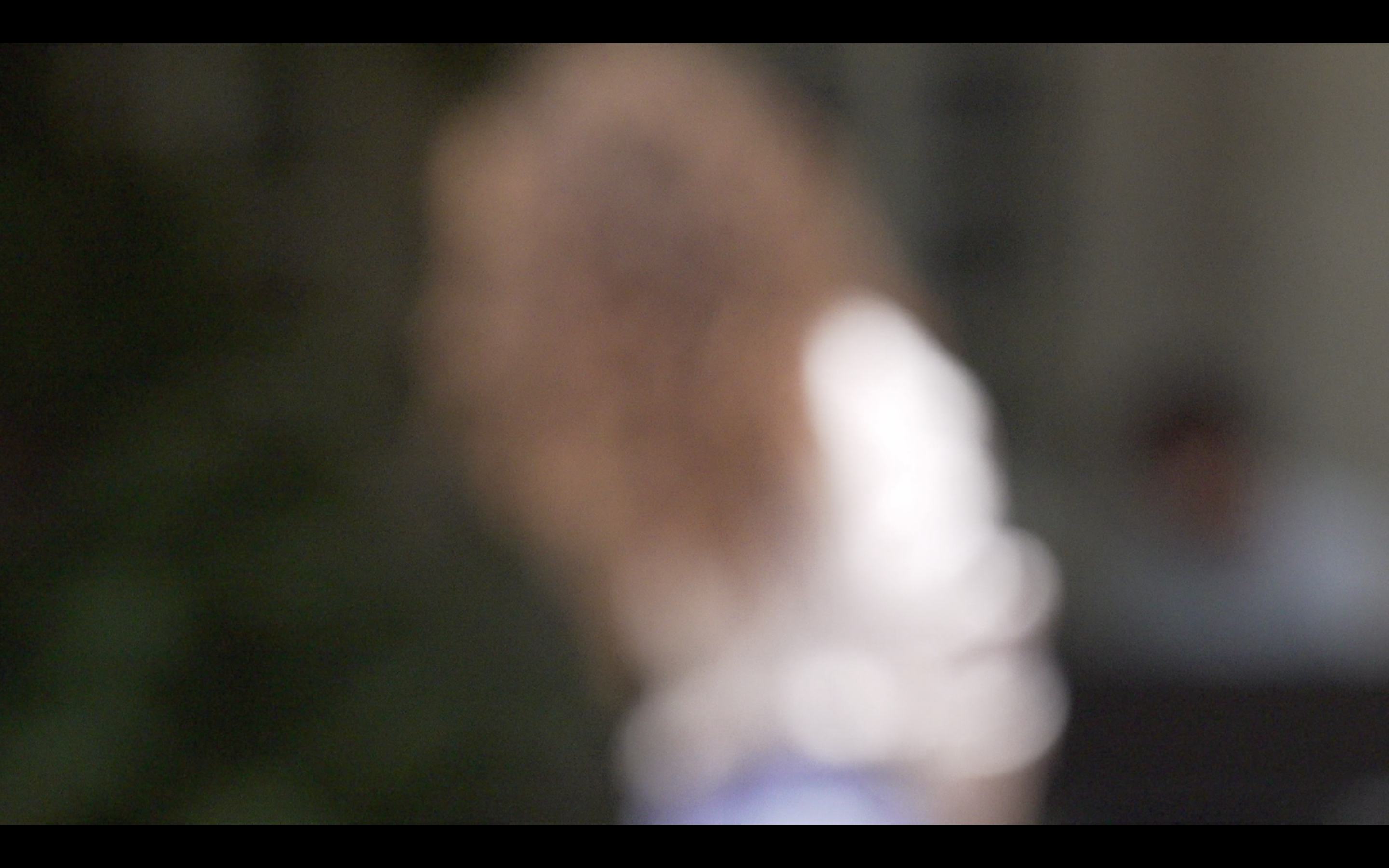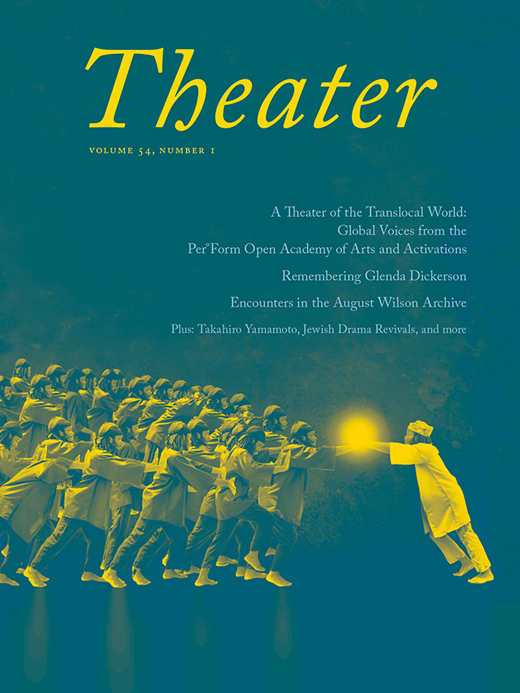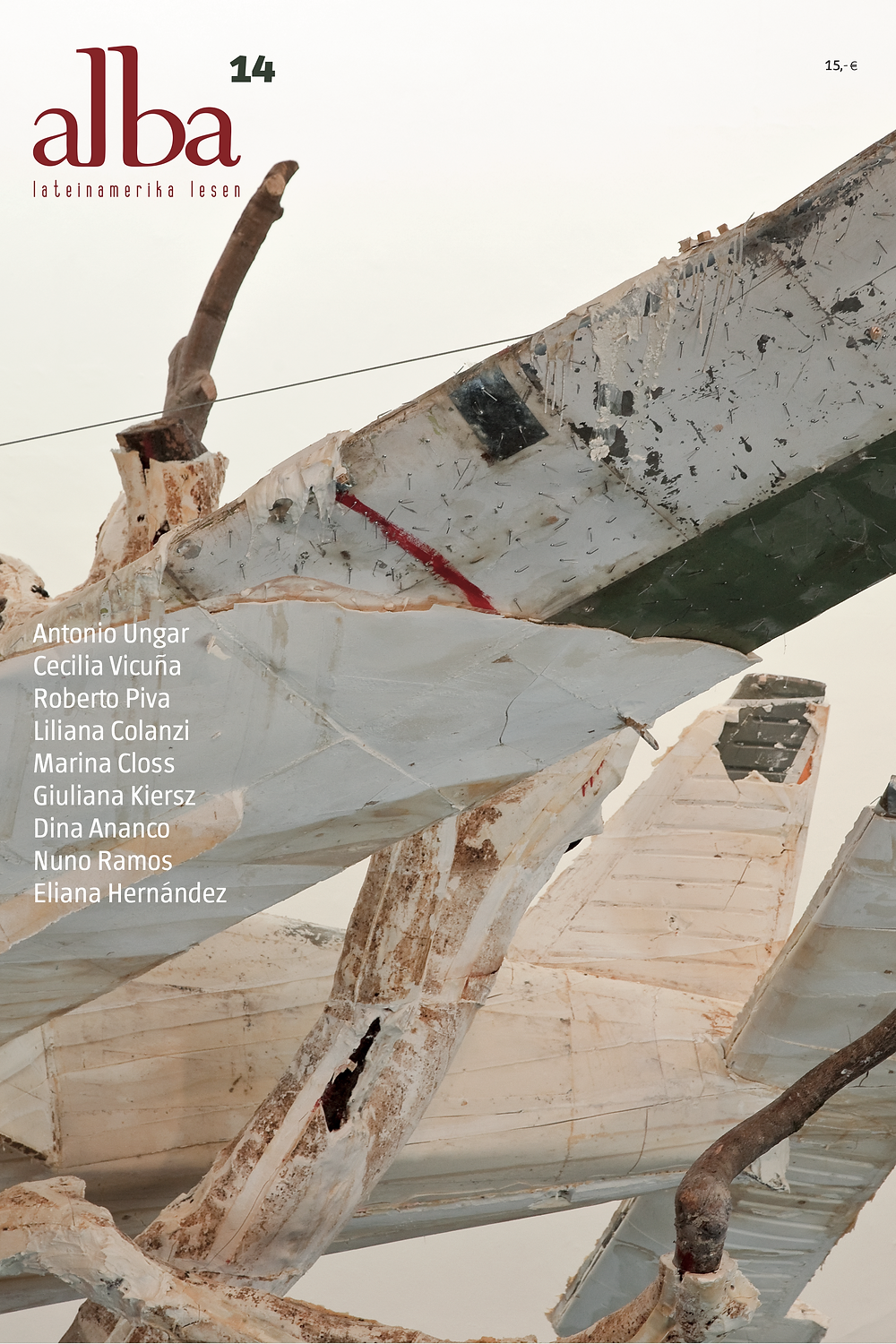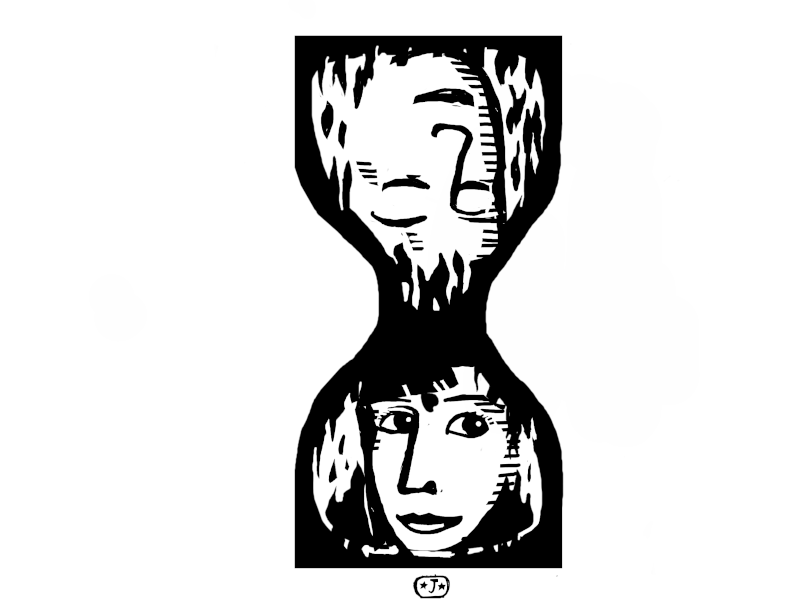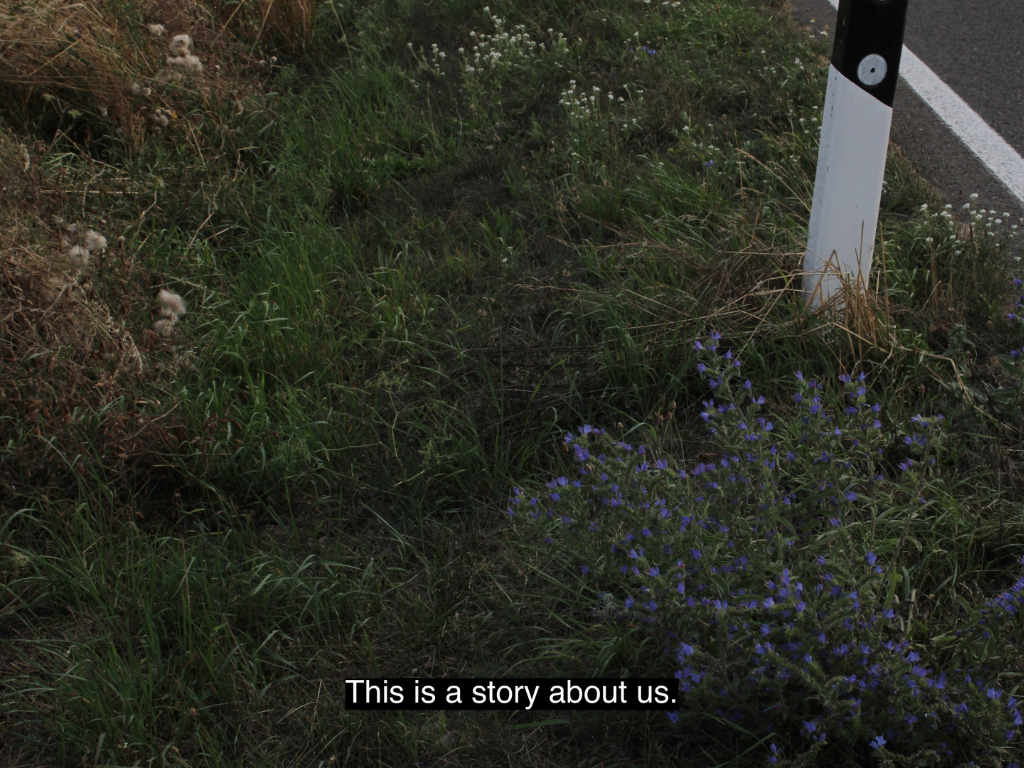Giuliana Kiersz es poeta, dramaturga y artista de Buenos Aires, Su obra explora las intersecciones entre espacio y lenguaje para imaginar nuevos horizontes políticos y sociales.Actualmente vive en Berlín.
giukiersz@gmail.com
giukiersz@gmail.com
Giuliana Kiersz is a Berlin-based poet, playwright, librettist and artist originally from Buenos Aires. Her work explores the intersections between space and language and imagines new political and social horizons.

Novedades - News
Premios - Awards
Queremos ser nuestros propios líderes, Premio Estímulo a la Escritura en Dramaturgia, Todos los Tiempos el Tiempo, Fundación PROA, Fundación Bunge y Born y La Nación
El Fin / El principio, Maison Antoine Vitez, traduit del’espagnol par Maud Flank, 2023
Publicaciones - Publications
Your Language Is Lying to You, Theater, Duke University Press and David Geffen School of Drama at Yale University, 2024
Obras - Shows
Es algo vivo - Eine Abend mit der Berliner latinoamerikanischen Literaturszene, Internationales Literaturfestival Berlin, September 18th, 2025
Ouverture (Opera) performance at Festival Aperto, October 3th 2025, Festival Verdi, October 5th 2025
Obras - Performances / Theatre plays / Operas
Óperas - Operas
Ouverture, Festival Aperto, Festival Verdi (Parma, Reggio Emilia, 2025)
Desert of Water, Deutsche Oper (Berlin, 2025)
L'écosystème humain?, Short Operetta Festival, SALZKAMMERGUT (Bad Ischl, 2024)
Performances
Your language is lying to you, T:>Works (Singapore, 2023)
If something like this exists, The curator's suitcase, 5. Berliner Herbstsalon, Maxim Gorki Theater (Berlin, 2022)
Obras de teatro - Theatre plays
Antes de desaparecer, Leap Off Page (Gabrovo, 2023)
El fin, Festival Internacional de Buenos Aires (2019) ; Festival El Aleph (Mexico, 2020)
Xalapa, un museo para el futuro, Compañía Titular de la Universidad Veracruzana, Teatro La Caja (Xalapa, 2019)
Before the seas rise, Stiftung Künstlerdorf Schöppingen (NRW, 2021)
Antes de que suban los mares, Centro Cultural del Bosque (Ciudad de México, 2019); Teatro La Caja (Xalapa, 2019)
Antes, Jardín Sonoro, Jardín Botánico Carlos Thays (Buenos Aires, 2019); Festival de teatro de Rafaela (Rafaela, 2019); Festival Internacional de Teatro Universitario UNAM (Ciudad de México, 2020)
Vogliamo essere padroni di noi stesse, lectura, BETSUD, Festival Primavera dei Teatri (Castrovillari, 2019)
502, Tejiendo Redes, Casa de Cultura de la Universidad Autónoma del Estado de México en Tlalpan (Ciudad de México, 2019)
B, Teatro Casa de la Paz (Ciudad de México, 2019); Área 51 (Xalapa, 2019); Club Cultural Matienzo (Buenos Aires, 2017)
Líneas de fuga, Casa de Cultura de la Universidad Autónoma del Estado de México en Tlalpan (Ciudad de México, 2017)
Lecturas - Readings
Antes de desaparecer, Siesta Festival (Berlin, 2024)
Your Language Is Lying to You, Open Night Mic, Middle Ground, HKW Hausder Kulturen der Welt (Berlin, 2024)
Publicaciones - Publications
Libros - Books
Poemas, Voces periféricas, Antología de poetas latinoamericanos en Alemania, Editorial Equidistancias
Schreib-Begegnungen. Gemeinsam die Zukunft schreiben Giuliana Kiersz, Praxisbuch Transformation dekolonisieren, Beltz Juventa, 2023
We've built something with no name, On care. A Journey into the Relational Nature of Artists' Residencies, VFMK Verlag für Moderne Kunst, asp Katwice, U-jazdowski and Akademie Schloss Solitude, Vienna, 2023
Lumières blanches intermittentes, Editions Espaces 34, Montpellier, 2022
¡Tomá mate! Unübersetzbare Begriffe, Edition Solitude & Archive Books (Berlin, 2022)
¡Tomá mate! Untranslatable Terms of Cultural Practices, Edition Solitude & Archive Books (Berlin, 201)
Una casa a dónde volver, Fuera del Canon, Ediciones del Espejo Somos (San Cristóbal de las Casas, 2020)
Luces blancas intermitentes, Rara Avis Editorial (Buenos Aires, 2018)
El fin
X Premios Germán Rozenmacher, Libros del Rojas (Buenos Aires, 2017)
El fin, Dramaturgia joven, Fondo Editorial ENSAD (Lima, 2019)
B, Libros Drama (Buenos Aires, 2016)
Isabel I, Teatro XV, Editorial INTeatro (Buenos Aires, 2015)
Revistas - Magazines
Making a Fire out of Despair, Sprache im digitalen Zeitalter, Temporal Communities, FU Berlin, Literarischen Colloquium Berlin (Berlin, 2023)
Your Language Is Lying to You, Theatre, Duke University Press and David Geffen School of Drama at Yale University, 2024
Love Letter, Critically HOT, 2024
Lo que duele I - Was weh tut I, Alba lateinamerika lesen 14° (Berlin, 2023)
El fin I - Das Ende I, Lateinamerika Nachrichten (Berlin, 2023)
El principio, IOWA literaria (IOWA, 2022)
Sammeln, Stadtsprachen (Berlin, 2022)
From the kitchen window I see the world, Schlosspost, Akademie Schloss Solitude (Stuttgart, 2020)
Un diario, Revista Sotobosque (Montevideo, 2020)
B, alternatives théâtrales, edición 137° (Brussels, 2019)
Dejé de saber escribir de a poco, Revista de historia y teoría del arte (Tandil, 2019)
Obras - Works of art
Making a fire out of despair, Assemblage Berlin. 60 Jahre Literatur intermedial, Literarischen Colloquium (Berlin, 2023)
Un museo
Feminist audio guide for an ethnographic museum - Audioguía feminista para un museo etnográfico
Linden-Museum (Stuttgart, 2021 - 2023)
A mis amigas
The curator's suitcase, 5. Berliner Herbstsalon, Maxim Gorki Theater (Berlin, 2022)
Spaces with words, words for fantasies
Prenzlauer Studio (Berlin, 2021)
Map of empty space
Fonds Darstellende Künste e.V.
(Brandenburg, 2021)
Someone asked who we are and we didn’t know what to answer
Beyond walls, Kunstmuseum (Stuttgart, 2021); Ambactia Memoria,
Kastanien Projectraum (Berlin, 2021)
Sammeln collect coleccionar
Beyond walls, Kunstmuseum (Stuttgart, 2021)
I don’t know if we’ll ever kiss strangers again
Akademie Schloss Solitude (Stuttgart, 2020)
A la mujer trabajadora, Textil Colonia Rosal S.A.
Konvent Zero (Barcelona, 2019)
En lo que de mí dependa
Se Alquila/Estado (Asunción, 2016); Club Cultural Matienzo (Buenos Aires, 2015)
Encuentros de escritura - Writing Gatherings
Los Encuentros de escritura (2017 - en curso) son espacios políticos y sensibles para escribir y pensar colectivamente.
Writing Gatherings (2017 - ongoing) is a literature and art project that creates political and sensitive spaces to practice collaborative thnking through writing.
Barrio Berlin (Berlin, 2024), Literarischen Colloquium Berlin (Berlin, 2023), T:>Works (Singapore, 2023) (Re) Gaining Ecological Futures, Floating (Berlin, 2021 and 2022), Andenbuch (Berlin, 2022), The curator´s Suitcase, Maxim Gorki Theater (Berlin, 2021), Brussels, city of stories, Muntpunt (Brussels, 2021), Ciudad Escena (Buenos Aires, 2021), Liminoid Encounters, Akademie Schloss Solitude (Stuttgart, 2020), Art University (Tandil, 2019), Maison de l’Argentine (Paris, 2019), Lata peinada (Barcelona, 2019), National Institute of Scenic Arts (Montevideo 2019), Garrison institute (New York, 2018), Women Playwrights International (Santiago de Chile, 2018)
Obras - Performances / Theater plays / Operas


Desert of Water
Opera
Desert of Water erzählt die Geschichte eines Dorfes, das vor einer Überflutung evakuiert werden muss. Ohnmächtig halten die Figuren an einem Alltag fest, der zunehmend auseinanderbricht und begegnen der unausweichlichen Bedrohung dabei auf unterschiedliche Weise: Während die meisten der Tatsache ins Auge blicken, dass sie ihrer Heimat den Rücken zukehren müssen, um zu überleben, ist eine Bewohnerin nicht dazu bereit und hält bis zum bitteren Ende an ihrem Lebensraum fest. Die Kammeroper der Komponistin Huihui Cheng und der Librettistin Giuliana Kiersz beschreibt Zustände einer Extremsituation und verhandelt das Dilemma der Konfrontation mit einer allumfassenden Katastrophe. Durch spannungsgeladene Klangflächen, symbolische Naturlyrik und variantenreiche Vokaltechniken wird die vielschichtige Anspannung einer bedrohlichen Ausgangslage erfahrbar, die Assoziationen zu den tagesaktuellen Themenkomplexen Klimawandel, Flucht und Identität weckt.
Komposition: Huihui Cheng
Text: Giuliana Kiersz
Musikalische Leitung: Rira Kim
Inszenierung: Ruth Asralda
Dramaturgie: Sara Elisa Zimmermann
The Traveller: Varvara Nikishina
The Woman Who Stays: Janka Watermann
The Wanderer: Maria Vidal
The Man Who Drowned: Darius Herrmann
Es spielen: Studierende der Hochschule für Musik Hanns Eisler
Neue Szenen VII
Deutsche Oper Berlin
(Berlin, 2025)
Opera
Desert of Water erzählt die Geschichte eines Dorfes, das vor einer Überflutung evakuiert werden muss. Ohnmächtig halten die Figuren an einem Alltag fest, der zunehmend auseinanderbricht und begegnen der unausweichlichen Bedrohung dabei auf unterschiedliche Weise: Während die meisten der Tatsache ins Auge blicken, dass sie ihrer Heimat den Rücken zukehren müssen, um zu überleben, ist eine Bewohnerin nicht dazu bereit und hält bis zum bitteren Ende an ihrem Lebensraum fest. Die Kammeroper der Komponistin Huihui Cheng und der Librettistin Giuliana Kiersz beschreibt Zustände einer Extremsituation und verhandelt das Dilemma der Konfrontation mit einer allumfassenden Katastrophe. Durch spannungsgeladene Klangflächen, symbolische Naturlyrik und variantenreiche Vokaltechniken wird die vielschichtige Anspannung einer bedrohlichen Ausgangslage erfahrbar, die Assoziationen zu den tagesaktuellen Themenkomplexen Klimawandel, Flucht und Identität weckt.
Komposition: Huihui Cheng
Text: Giuliana Kiersz
Musikalische Leitung: Rira Kim
Inszenierung: Ruth Asralda
Dramaturgie: Sara Elisa Zimmermann
The Traveller: Varvara Nikishina
The Woman Who Stays: Janka Watermann
The Wanderer: Maria Vidal
The Man Who Drowned: Darius Herrmann
Es spielen: Studierende der Hochschule für Musik Hanns Eisler
Neue Szenen VII
Deutsche Oper Berlin
(Berlin, 2025)
L'écosystème humain?
Short Operetta
L’écosystème humain ? is an operetta that takes discourses from the current growing far-right movements in Europe to deconstruct their narratives from a decolonizing perspective.
The operetta is permeated by sociology, micro-narratives, humour, criticism and the possible transmediality between dramaturgy and musical composition, favouring a third term of artistic expression.
A project by Bad Ischl-Salzkammergut European Capital of Culture 2024 in collaboration with Lehár Festival, Ensemble Multilatérale and Mozarteum University Salzburg.
Composition: Fernando Strasnoy
Libretto: Giuliana Kiersz
Link to full performance
Short Operetta Festival, SALZKAMMERGUT
(Bad Ischl, 2024)
Short Operetta
L’écosystème humain ? is an operetta that takes discourses from the current growing far-right movements in Europe to deconstruct their narratives from a decolonizing perspective.
The operetta is permeated by sociology, micro-narratives, humour, criticism and the possible transmediality between dramaturgy and musical composition, favouring a third term of artistic expression.
A project by Bad Ischl-Salzkammergut European Capital of Culture 2024 in collaboration with Lehár Festival, Ensemble Multilatérale and Mozarteum University Salzburg.
Composition: Fernando Strasnoy
Libretto: Giuliana Kiersz
Link to full performance
Short Operetta Festival, SALZKAMMERGUT
(Bad Ischl, 2024)


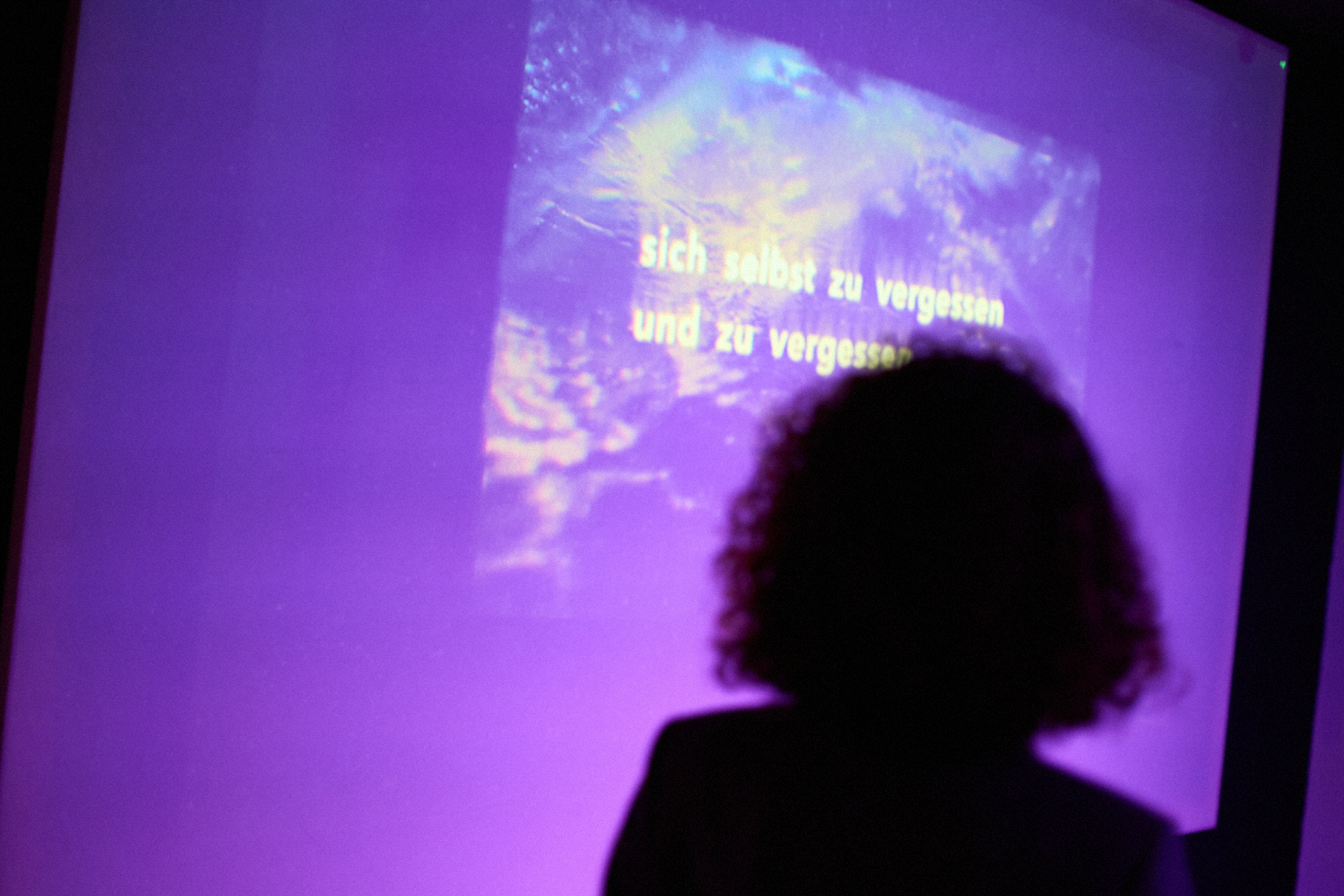
Antes de desaparecer
Performance
Text-based dance performance with choreography and dance by Zhana Pencheva.
Link to full performance
Leap Off Page
(Gabrovo, 2023)
Text-based performance with visuals and music by Ian Kornfeld.
Siesta Festival
(Berlin, 2024)
Performance
Text-based dance performance with choreography and dance by Zhana Pencheva.
Link to full performance
Leap Off Page
(Gabrovo, 2023)
Text-based performance with visuals and music by Ian Kornfeld.
Siesta Festival
(Berlin, 2024)
II
descreer del placer
confiar en el caos
buscar la tristeza
adorar el fuego
hacer altares que nos recuerden
quiénes somos
quiénes queríamos ser
encender velas que prendan fuego casas
y cuidar a las palomas que caen de los nidos
abandonarlas para que aprendan a crecer
y nosotros
aprendamos a dejar ir
eso que amamos
sin llorar
sin pensar
por qué
y hasta cuándo
y hacernos promesas
que no vamos a cumplir
decirnos: algún día
entregarnos a voluntades ajenas
en tierras lejanas
dejar que otros usen
nuestros cuerpos
nuestras voces
nuestra fé
descreer del placer
confiar en el caos
buscar la tristeza
adorar el fuego
hacer altares que nos recuerden
quiénes somos
quiénes queríamos ser
encender velas que prendan fuego casas
y cuidar a las palomas que caen de los nidos
abandonarlas para que aprendan a crecer
y nosotros
aprendamos a dejar ir
eso que amamos
sin llorar
sin pensar
por qué
y hasta cuándo
y hacernos promesas
que no vamos a cumplir
decirnos: algún día
entregarnos a voluntades ajenas
en tierras lejanas
dejar que otros usen
nuestros cuerpos
nuestras voces
nuestra fé
Your Language Is Lying to You
Performance
Your Language Is Lying to You, poetry as a territory for action is a provocation to explore the ideas, structures, and beliefs that inhabit our words. It is a poem-essay on the languages that we have inherited, the ones that we forgot, and the ones we decided to create to transform our history, name our feelings, and invent other forms of living. It reflects on embodied, contextualised, and alive writing opening questions on transformation and collectivisation, inviting us to think of poetry as an intersectional practice to intervene in our societies.
Translated by William Gregory
T:>Works (Singapore, 2023)
Performance
Your Language Is Lying to You, poetry as a territory for action is a provocation to explore the ideas, structures, and beliefs that inhabit our words. It is a poem-essay on the languages that we have inherited, the ones that we forgot, and the ones we decided to create to transform our history, name our feelings, and invent other forms of living. It reflects on embodied, contextualised, and alive writing opening questions on transformation and collectivisation, inviting us to think of poetry as an intersectional practice to intervene in our societies.
Translated by William Gregory
T:>Works (Singapore, 2023)
As i write
twelve thousand kilometres away
my grandmother sings in Yiddish in a hospital
the Spanish she learned at school
has fallen apart in the songs her mother sang her
i wonder how long those songs will take to die
some loves are too big for words
as i write
inflation is rising
as i write
evictions
as i write Laura Richardson asks: why does Latin America matter?
at school my sister studies the processes of independence
and in Argentina people march for memory, truth and justice
some struggles are too big for words.
twelve thousand kilometres away
my grandmother sings in Yiddish in a hospital
the Spanish she learned at school
has fallen apart in the songs her mother sang her
i wonder how long those songs will take to die
some loves are too big for words
as i write
inflation is rising
as i write
evictions
as i write Laura Richardson asks: why does Latin America matter?
at school my sister studies the processes of independence
and in Argentina people march for memory, truth and justice
some struggles are too big for words.
If something like this exists,
Performance
A poem written about, and in search of, language and the act of naming. An essay on the words we have had to learn to explain the world and to name ourselves. a reflection on the practice of writing as the creation of political spaces. A wander through the movements and territories that inhabit our words, through the words that inhabit us, and through that which we can't name; the processes that fracture our voices, and what we find between the cracks.
Live music by Ben Osborn
Photos by Ute Langkafel
Translated by William Gregory
The curator's suitcase, 5. Berliner Herbstsalon, Maxim Gorki Theater
(Berlin, 2022)
Performance
A poem written about, and in search of, language and the act of naming. An essay on the words we have had to learn to explain the world and to name ourselves. a reflection on the practice of writing as the creation of political spaces. A wander through the movements and territories that inhabit our words, through the words that inhabit us, and through that which we can't name; the processes that fracture our voices, and what we find between the cracks.
Live music by Ben Osborn
Photos by Ute Langkafel
Translated by William Gregory
The curator's suitcase, 5. Berliner Herbstsalon, Maxim Gorki Theater
(Berlin, 2022)
El fin
Theatre play
X Premio Germán Rozenmacher
I
El fin de las cosas nos acerca.
No sabemos qué queremos.
Sabemos qué no queremos.
No queremos que los edificios caigan.
No queremos que los puentes exploten.
No queremos que los autos sigan dando vueltas en el aire.
No queremos que llueva.
No queremos ver agua en todo lo que vemos.
No queremos dejar de querernos.
Nos acercamos.
Y esperamos juntos.
Y el olor que sentimos a quemado es cada vez más fuerte y el
cielo, más rojo.
Y no vemos hacia la ventana porque no queremos ver y nos
acostamos y nos empezamos a sacar la ropa.
Nos acostamos desnudos.
Uno al lado del otro.
El fin del mundo nos vuelve románticos.
Dirección: Maruja Bustamante
Intérpretes: Bárbara massó, Diego Benedetto, Camila Conte Roberts, Belén Gatti
Música y diseño sonoro: Paula Maffia
Diseño Lumínico: Verónica Alcoba
Video: Laura Castro
Asesoramiento coreográfico: Jazmín Titiunik
Asistencia de dirección: Maxi Muti
Producción general: Valeria cassieles
Festival internacional de Buenos Aires (Buenos Aires, 2019)
Vamos a quemarlo todo, Página 12
El fin, el arte de dirigir un texto poético, La Nación
El fin, Revista Otra Parte
Theatre play
X Premio Germán Rozenmacher
I
El fin de las cosas nos acerca.
No sabemos qué queremos.
Sabemos qué no queremos.
No queremos que los edificios caigan.
No queremos que los puentes exploten.
No queremos que los autos sigan dando vueltas en el aire.
No queremos que llueva.
No queremos ver agua en todo lo que vemos.
No queremos dejar de querernos.
Nos acercamos.
Y esperamos juntos.
Y el olor que sentimos a quemado es cada vez más fuerte y el
cielo, más rojo.
Y no vemos hacia la ventana porque no queremos ver y nos
acostamos y nos empezamos a sacar la ropa.
Nos acostamos desnudos.
Uno al lado del otro.
El fin del mundo nos vuelve románticos.
Dirección: Maruja Bustamante
Intérpretes: Bárbara massó, Diego Benedetto, Camila Conte Roberts, Belén Gatti
Música y diseño sonoro: Paula Maffia
Diseño Lumínico: Verónica Alcoba
Video: Laura Castro
Asesoramiento coreográfico: Jazmín Titiunik
Asistencia de dirección: Maxi Muti
Producción general: Valeria cassieles
Festival internacional de Buenos Aires (Buenos Aires, 2019)
Vamos a quemarlo todo, Página 12
El fin, el arte de dirigir un texto poético, La Nación
El fin, Revista Otra Parte
Los fines. Historia colectiva desde escenarios íntimos
Theatre play
Es un ejercicio visual en el que se expone la intimidad de 75 universos femeninos, trazos de un recorrido por la diversidad de los confinamientos. Es la conversión de estancias personales en una experiencia colectiva guiada por la lectura de El fin, dramaturgia de la argentina Giuliana Kiersz, testimonio y advertencia de desalojos y éxodos. Secuencia de imágenes de una cotidianeidad atrapada en la pandemia, interacción a vuelo de pájaro de los cuerpos de mujeres con objetos a veces olvidados y con los espacios por donde ellas se desplazan avanzando y retrocediendo en cuarentena.
Dirección: Sara Pinedo
Edición y arte: Cuauhtémoc Vázquez, Alejandro Carrillo, Jozé W. Paredes
Diseño sonoro: Kaira Rodríguez
El aleph, festival de arte y ciencia
(Ciudad de México, 2020)
Los imperdibles del aleph, UNAM global
Theatre play
Es un ejercicio visual en el que se expone la intimidad de 75 universos femeninos, trazos de un recorrido por la diversidad de los confinamientos. Es la conversión de estancias personales en una experiencia colectiva guiada por la lectura de El fin, dramaturgia de la argentina Giuliana Kiersz, testimonio y advertencia de desalojos y éxodos. Secuencia de imágenes de una cotidianeidad atrapada en la pandemia, interacción a vuelo de pájaro de los cuerpos de mujeres con objetos a veces olvidados y con los espacios por donde ellas se desplazan avanzando y retrocediendo en cuarentena.
Dirección: Sara Pinedo
Edición y arte: Cuauhtémoc Vázquez, Alejandro Carrillo, Jozé W. Paredes
Diseño sonoro: Kaira Rodríguez
El aleph, festival de arte y ciencia
(Ciudad de México, 2020)
Los imperdibles del aleph, UNAM global
Xalapa, un museo para el futuro
Theatre play
Una obra de canciones sobre xalapa desarrollada en una residencia de dos semanas junto a la Compañía Titular de Teatro de la Universidad Veracruzana y a Ben Osborn.
Teatro la caja
(Xalapa, 2019)
Theatre play
Una obra de canciones sobre xalapa desarrollada en una residencia de dos semanas junto a la Compañía Titular de Teatro de la Universidad Veracruzana y a Ben Osborn.
Teatro la caja
(Xalapa, 2019)
Underdogs
Theatre play
En una tierra al sur del mundo, Manuela llega a la presidencia gracias a un acuerdo con su partido opositor. Detrás de ella Horacio y Esteban construyen su figura pública. Frente a ella, Los Dbiles. entre deseos y manifestaciones, manuela intentará sostener más de doscientos años de promesas imposibles.
escrita dentro del programa de talleres en américa latina del royal court theatre.
Ciclo Tintas Frescas, Teatro Nacional Cervantes
(Buenos Aires - 2019)
Theatre play
En una tierra al sur del mundo, Manuela llega a la presidencia gracias a un acuerdo con su partido opositor. Detrás de ella Horacio y Esteban construyen su figura pública. Frente a ella, Los Dbiles. entre deseos y manifestaciones, manuela intentará sostener más de doscientos años de promesas imposibles.
escrita dentro del programa de talleres en américa latina del royal court theatre.
Ciclo Tintas Frescas, Teatro Nacional Cervantes
(Buenos Aires - 2019)
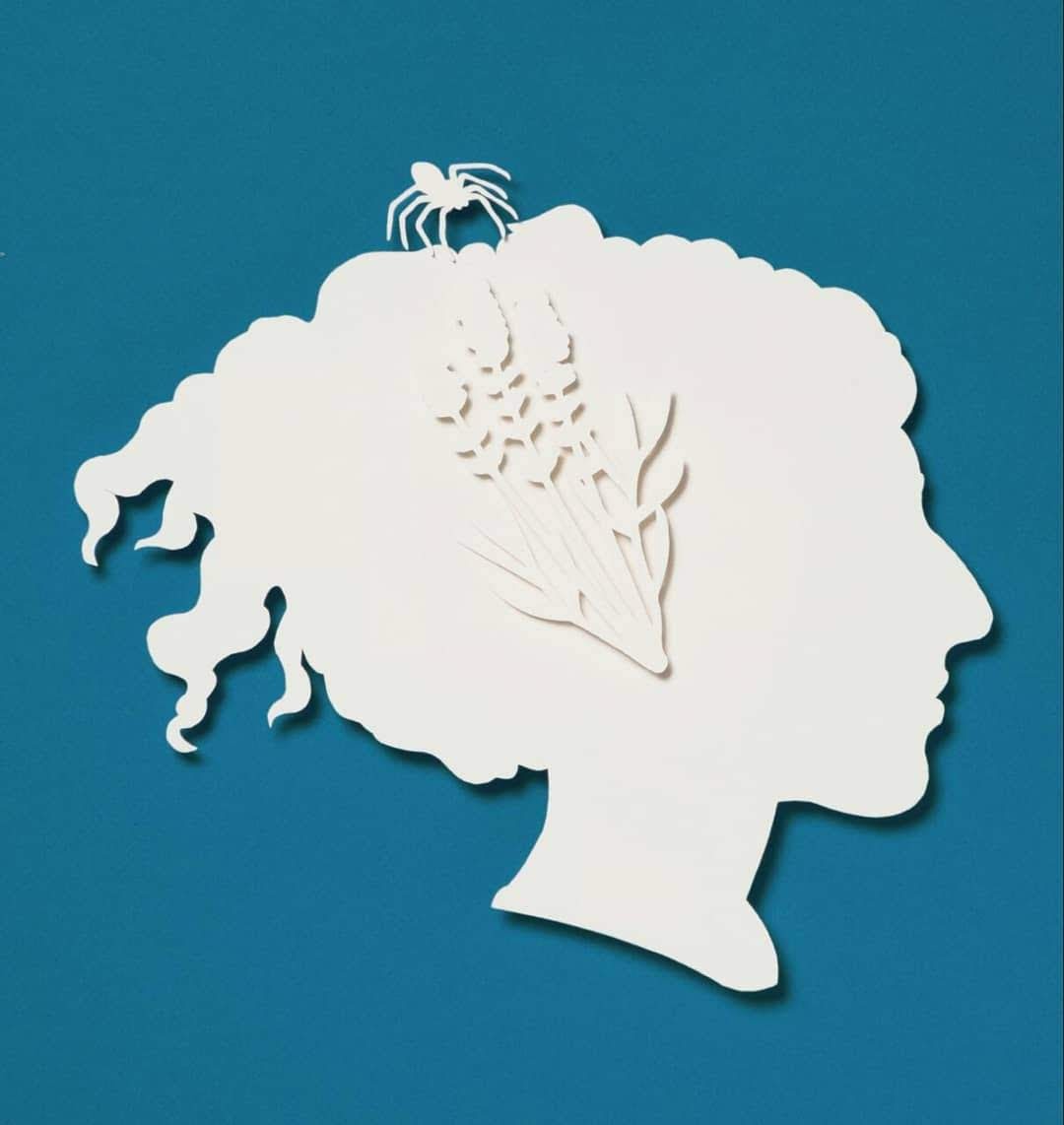
Antes, Jardin sonoro
Theatre play
Jardín Botánico Carlos Thays (Buenos Aires, 2019)
Festival de teatro de Rafaela (Rafaela, 2019)
Festival Internacional de Teatro Universitario UNAM (Ciudad de México, 2020)
Lectura: Gabriela Bejerman
Un grupo de dramaturgas le pone sonido al botánico porteño, La Nación
“Jardín sonoro”, un recorrido teatral por la naturaleza, Clarín
Mapa de ficciones que llegan al botánico, Página 12
Jardín sonoro, una experiencia teatral para recorrer el botánico y escuchar historias, Revista Cultural Buenos Aires
El teatro atravesado por el sonido: Jardín sonoro en el #27 FITU UNAM, Ibermemoria
Theatre play
Jardín Botánico Carlos Thays (Buenos Aires, 2019)
Festival de teatro de Rafaela (Rafaela, 2019)
Festival Internacional de Teatro Universitario UNAM (Ciudad de México, 2020)
Lectura: Gabriela Bejerman
Un grupo de dramaturgas le pone sonido al botánico porteño, La Nación
“Jardín sonoro”, un recorrido teatral por la naturaleza, Clarín
Mapa de ficciones que llegan al botánico, Página 12
Jardín sonoro, una experiencia teatral para recorrer el botánico y escuchar historias, Revista Cultural Buenos Aires
El teatro atravesado por el sonido: Jardín sonoro en el #27 FITU UNAM, Ibermemoria
502
Theatre play
Dirección: Liliana Andrea Cuervo y Valeria Fabbri
(Ciudad de México, 2019)
Tejiendo Redes
Casa de Cultura de la Universidad Autónoma del Estado de México en Tlalpan
(Ciudad de México, 2019)
Theatre play
Dirección: Liliana Andrea Cuervo y Valeria Fabbri
(Ciudad de México, 2019)
Tejiendo Redes
Casa de Cultura de la Universidad Autónoma del Estado de México en Tlalpan
(Ciudad de México, 2019)
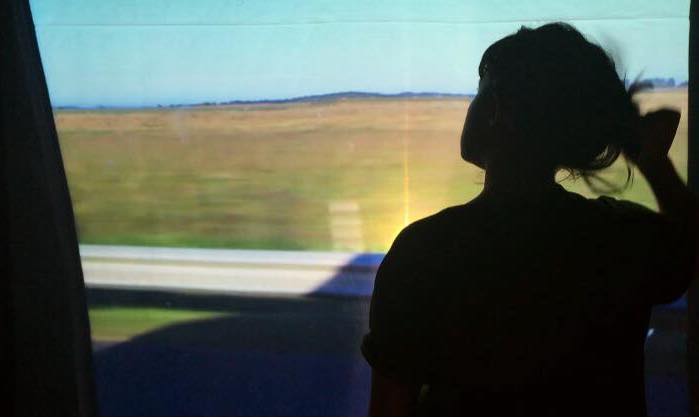
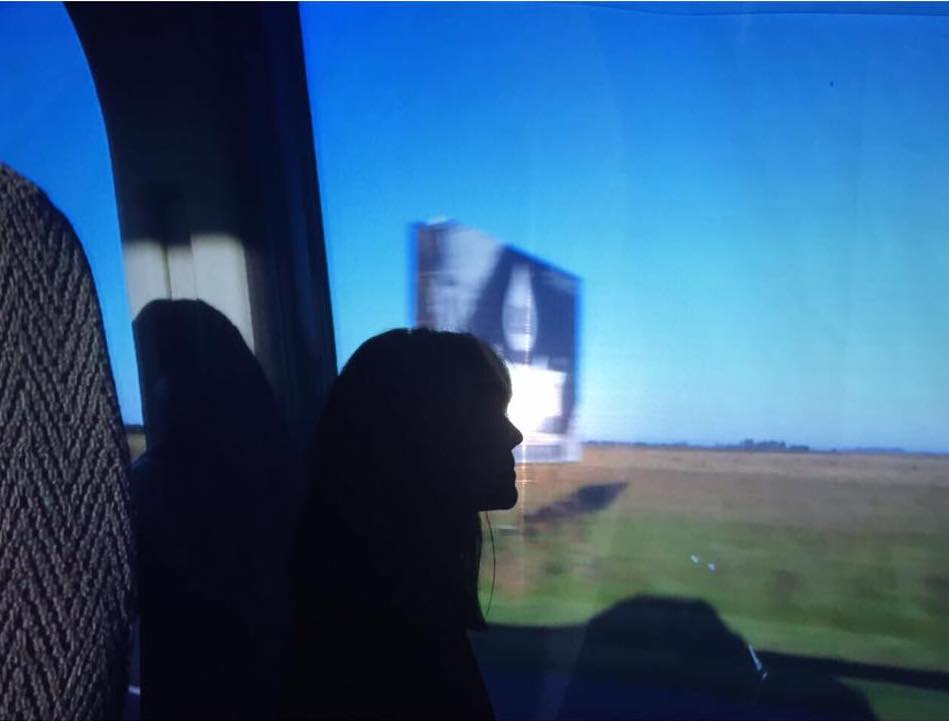
B
Theatre play
Mención IX Premio Germán Rozenmacher
Dirección e interpretación: Isabel Toledo
Teatro Casa de la Paz
(Ciudad de México, 2017)
Dirección: Nicolás Lodigiani
Intérprete: Telma Crisanti
Club Cultural Matienzo
(Buenos Aires, 2017)
Intérprete: Giuliana Kiersz
Música en vivo: Ben Osborn
Área 51
(Xalapa, 2019)
Theatre play
Mención IX Premio Germán Rozenmacher
Dirección e interpretación: Isabel Toledo
Teatro Casa de la Paz
(Ciudad de México, 2017)
Dirección: Nicolás Lodigiani
Intérprete: Telma Crisanti
Club Cultural Matienzo
(Buenos Aires, 2017)
Intérprete: Giuliana Kiersz
Música en vivo: Ben Osborn
Área 51
(Xalapa, 2019)
Before the seas rise
Performance
3
and let the seas rise
and the water
overtake us
so that we can’t breathe
and the glowing colours
greet us
and make us welcome
it is not the sea
my love
it is ourselves
it is not the sea
it is ourselves.
Translated by Ben Osborn
Stiftung Künstlerdorf Schöppingen
(Schöppingen, 2021)
Nonofestival
(Rosow, 2020)
Performance
3
and let the seas rise
and the water
overtake us
so that we can’t breathe
and the glowing colours
greet us
and make us welcome
it is not the sea
my love
it is ourselves
it is not the sea
it is ourselves.
Translated by Ben Osborn
Stiftung Künstlerdorf Schöppingen
(Schöppingen, 2021)
Nonofestival
(Rosow, 2020)
Antes de que suban los mares
Performance
1
los mares van a subir pronto
están subiendo
los vemos desde la ventana desde nuestras casas cómo el agua llega
cada vez un poco más
Teatro el granero, Centro Cultural del Bosque
Laboratorio de creación escénica a distancia
(Ciudad de México - 2019)
Martha Rodríguez Mega y Giuliana Kiersz presentan “Antes de que suban los mares”, Cartelera de teatro méxico
Antes de que suban los mares, Perspectivas
Volver a casa: la literatura del cambio climático, Letras Libres
Performance
1
los mares van a subir pronto
están subiendo
los vemos desde la ventana desde nuestras casas cómo el agua llega
cada vez un poco más
Teatro el granero, Centro Cultural del Bosque
Laboratorio de creación escénica a distancia
(Ciudad de México - 2019)
Martha Rodríguez Mega y Giuliana Kiersz presentan “Antes de que suban los mares”, Cartelera de teatro méxico
Antes de que suban los mares, Perspectivas
Volver a casa: la literatura del cambio climático, Letras Libres
Queremos ser nuestros propios líderes
Theater play
Premio Estímulo a la Escritura en Dramaturgia, Todos los Tiempos el Tiempo, Fundación PROA, Fundación Bunge y Born y La Nación
(Buenos Aires, 2024)
Theater play
Premio Estímulo a la Escritura en Dramaturgia, Todos los Tiempos el Tiempo, Fundación PROA, Fundación Bunge y Born y La Nación
(Buenos Aires, 2024)
somos racistas
somos clasistas
somos xenófobxs
sólo conocemos una forma de hacer las cosas
nos relacionamos a través del dinero
desconfiamos de las personas lindas
desconfiamos de las personas exitosas
desconfiamos de las personas que están enamoradas
Festival Primavera dei Teatri
(Castrovillari, 2019)
somos clasistas
somos xenófobxs
sólo conocemos una forma de hacer las cosas
nos relacionamos a través del dinero
desconfiamos de las personas lindas
desconfiamos de las personas exitosas
desconfiamos de las personas que están enamoradas
Festival Primavera dei Teatri
(Castrovillari, 2019)
Publicaciones - Publications
Language escapes me
i’m defeated by admiration
curiosity
silence
Angélica’s poems from “A uterus is the size of a fist”
the videos of my sister dancing in front of the tv
my father feeding my grandmother
my boyfriend loves me with a grammar that he learned
from years of living together and from García Lorca’s poems
when can i use this word? he says
in Spain a hundred years ago
when we first met
he asked which language i preferred to speak in
in the language i learned from my parents
even though they didn’t learn it from theirs
speaking Spanish
for me is a kind of rest
for him it’s a language of affection.
i’m defeated by admiration
curiosity
silence
Angélica’s poems from “A uterus is the size of a fist”
the videos of my sister dancing in front of the tv
my father feeding my grandmother
my boyfriend loves me with a grammar that he learned
from years of living together and from García Lorca’s poems
when can i use this word? he says
in Spain a hundred years ago
when we first met
he asked which language i preferred to speak in
in the language i learned from my parents
even though they didn’t learn it from theirs
speaking Spanish
for me is a kind of rest
for him it’s a language of affection.
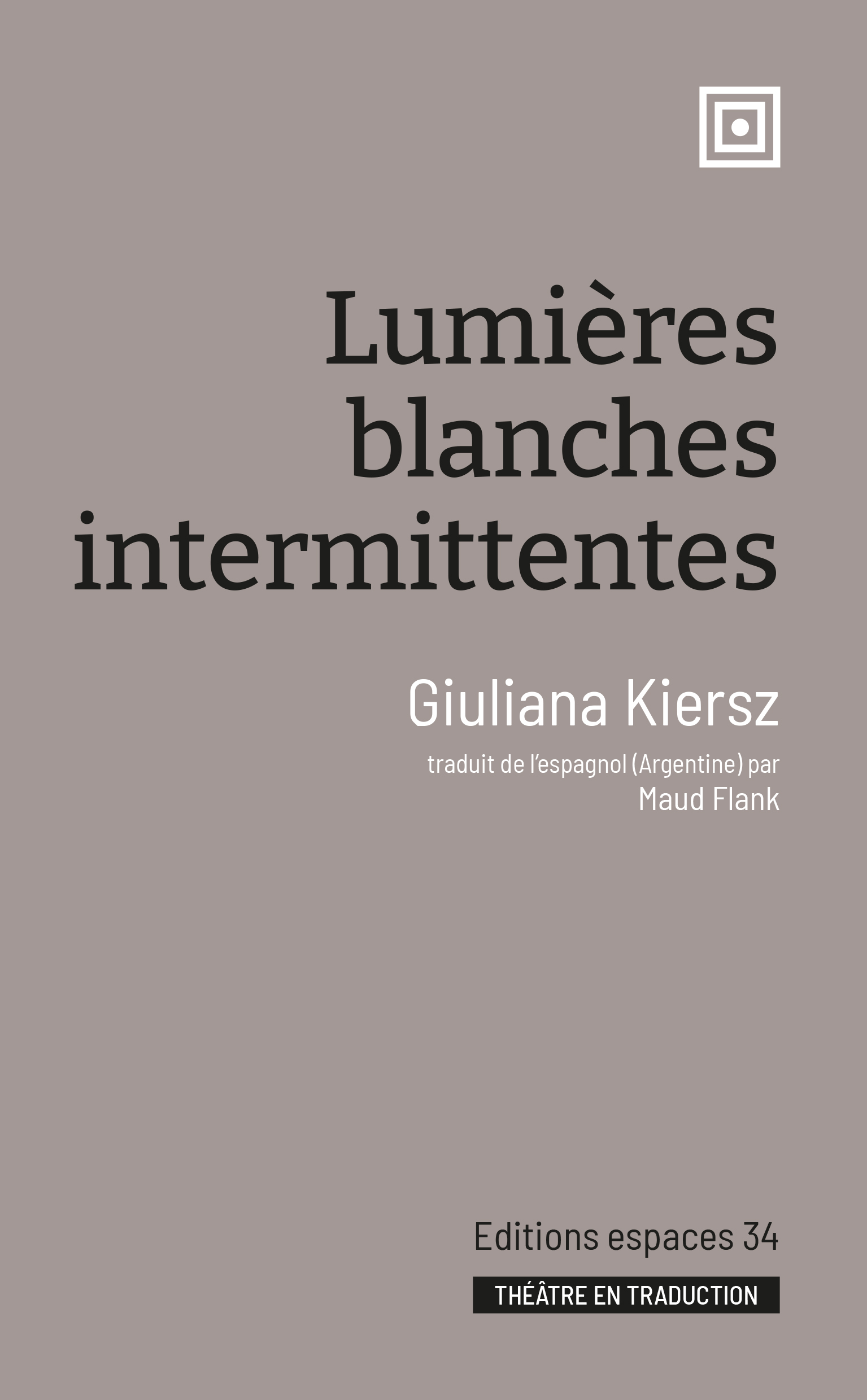
Lumières blanches intermittentes
(502, B et Le jour où elle m’a dit qu’elle avait tué le chien j’ai pris la voiture)
Publié avec le soutien de la Maison Antoine Vitez
Editions Espaces 34
(Montpellier, 2022)
Giuliana Kiersz, Lumières blanches intermittentes, Lelitteraire
(502, B et Le jour où elle m’a dit qu’elle avait tué le chien j’ai pris la voiture)
Publié avec le soutien de la Maison Antoine Vitez
Editions Espaces 34
(Montpellier, 2022)
Giuliana Kiersz, Lumières blanches intermittentes, Lelitteraire
Extrait de 502
BROUILLARD
QUELQU’UN DU PASSÉ. – maintenant tout se voile
je ne sais pas où je vais
je sais d’où je suis partie
je suis partie
je suis partie en sachant que je partais
enfin
et j’ai pensé
plus tard je reviendrai
je pense
je vais vouloir revenir
je vais vouloir ce que pour l’instant je ne veux pas
que pour l’instant je ne vois pas
que pour l’instant je ne connais pas
mais pas pour l’instant
je vois mes mains mes bras
je me touche la tête, les cheveux
humides comme la terre que je foule
sombres comme la terre que je foule
la terre que je ne suis pas
la brume que je ne suis pas
mes cheveux
je me vois
un peu plus loin
je sais que je disparais
je m’en vais et je vais quelque part
si le monde s’arrêtait à cet instant
je mourrais au milieu
après la fin
avant le commencement
dans le silence
le devenir
quelqu’un me trouvera
quelqu’un de plus censé
quelqu’un qui saura exactement où il se trouve
et où il se rend
ou bien quelqu’un qui n’aura pas besoin de savoir
verra mes cheveux s’enfoncer
dans la mer
alors il pensera
elle est morte alors qu’elle s’en allait.
BROUILLARD
QUELQU’UN DU PASSÉ. – maintenant tout se voile
je ne sais pas où je vais
je sais d’où je suis partie
je suis partie
je suis partie en sachant que je partais
enfin
et j’ai pensé
plus tard je reviendrai
je pense
je vais vouloir revenir
je vais vouloir ce que pour l’instant je ne veux pas
que pour l’instant je ne vois pas
que pour l’instant je ne connais pas
mais pas pour l’instant
je vois mes mains mes bras
je me touche la tête, les cheveux
humides comme la terre que je foule
sombres comme la terre que je foule
la terre que je ne suis pas
la brume que je ne suis pas
mes cheveux
je me vois
un peu plus loin
je sais que je disparais
je m’en vais et je vais quelque part
si le monde s’arrêtait à cet instant
je mourrais au milieu
après la fin
avant le commencement
dans le silence
le devenir
quelqu’un me trouvera
quelqu’un de plus censé
quelqu’un qui saura exactement où il se trouve
et où il se rend
ou bien quelqu’un qui n’aura pas besoin de savoir
verra mes cheveux s’enfoncer
dans la mer
alors il pensera
elle est morte alors qu’elle s’en allait.
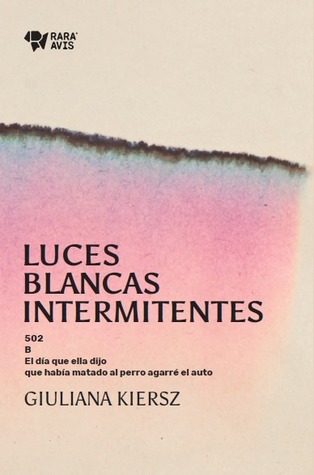
Luces blancas intermitentes
(502, B y El día que ella dijo que había matado al perro agarré el auto)
A través de paisajes abiertos y desoladores; entre objetos siniestros, malpensados y comportamientos tangentes, los textos generan plataformas inestables sobre las que sostenerse; nuevas ingenierías del escribir. La acción parece transcurrir sin de marcas de época, lugar o identificación. Los personajes no tienen nombre, las fechas no están dadas, los lugares son desconocidos. Los textos oscilan entre los límites del género drámatico: la escritura se acerca al registro poético y al narrativo.
Rara Avis Editorial
(Buenos Aires, 2018)
El protagonista como drama social, Página 12 Giuliana Kiersz en total interferencia, Radio Futurock
Reseñas caprichosas - “Luces blancas intermitentes de Giuliana Kiersz: el teatro es poesía”, la Primera Piedra
(502, B y El día que ella dijo que había matado al perro agarré el auto)
A través de paisajes abiertos y desoladores; entre objetos siniestros, malpensados y comportamientos tangentes, los textos generan plataformas inestables sobre las que sostenerse; nuevas ingenierías del escribir. La acción parece transcurrir sin de marcas de época, lugar o identificación. Los personajes no tienen nombre, las fechas no están dadas, los lugares son desconocidos. Los textos oscilan entre los límites del género drámatico: la escritura se acerca al registro poético y al narrativo.
Rara Avis Editorial
(Buenos Aires, 2018)
El protagonista como drama social, Página 12 Giuliana Kiersz en total interferencia, Radio Futurock
Reseñas caprichosas - “Luces blancas intermitentes de Giuliana Kiersz: el teatro es poesía”, la Primera Piedra
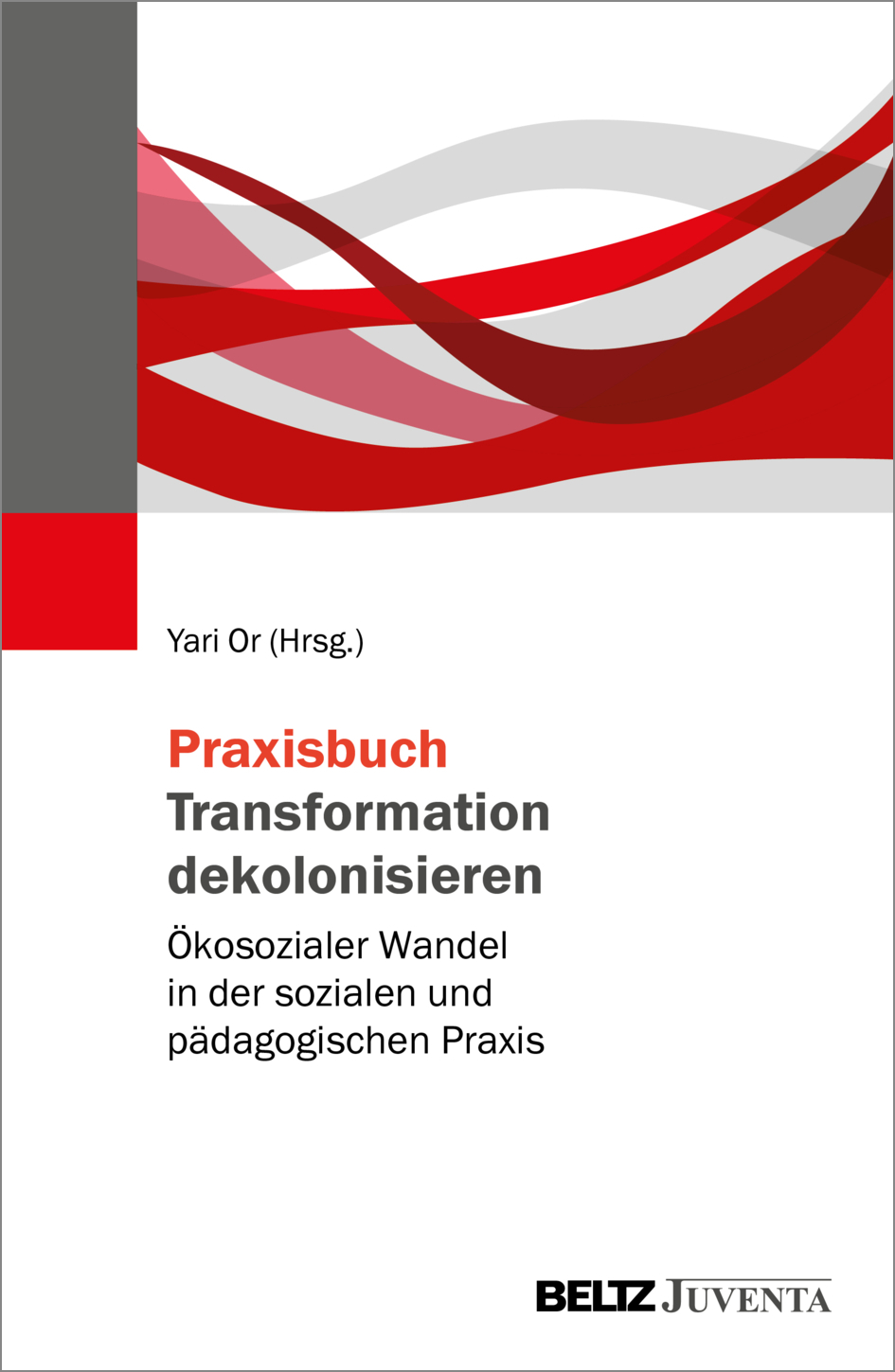
Poemas, Voces periféricas, Antología de poetas latinoamericanos en Alemania
II
es de noche y nos encontramos en el parque
estamos descubriendo
el cielo del norte
los mitos que nos fundaron
sin saberlo
una imaginación de dibujos
no podemos escribir
lo que queremos olvidar
no entran
los deseos
en las palabras
las discusiones
no necesitamos que las estrellas nos hablen
preferimos perdernos entre el frío
las velas
y las cervezas
estamos descubriendo
la medicina de las serpientes
que es lo mismo que rezarle a la luna
inventar la belleza
el azul en los mapas
que sin nosotras
hace años
miran el cielo
este cielo.
Editorial Equidistancias
(Berlin, 2024)
II
es de noche y nos encontramos en el parque
estamos descubriendo
el cielo del norte
los mitos que nos fundaron
sin saberlo
una imaginación de dibujos
no podemos escribir
lo que queremos olvidar
no entran
los deseos
en las palabras
las discusiones
no necesitamos que las estrellas nos hablen
preferimos perdernos entre el frío
las velas
y las cervezas
estamos descubriendo
la medicina de las serpientes
que es lo mismo que rezarle a la luna
inventar la belleza
el azul en los mapas
que sin nosotras
hace años
miran el cielo
este cielo.
Editorial Equidistancias
(Berlin, 2024)
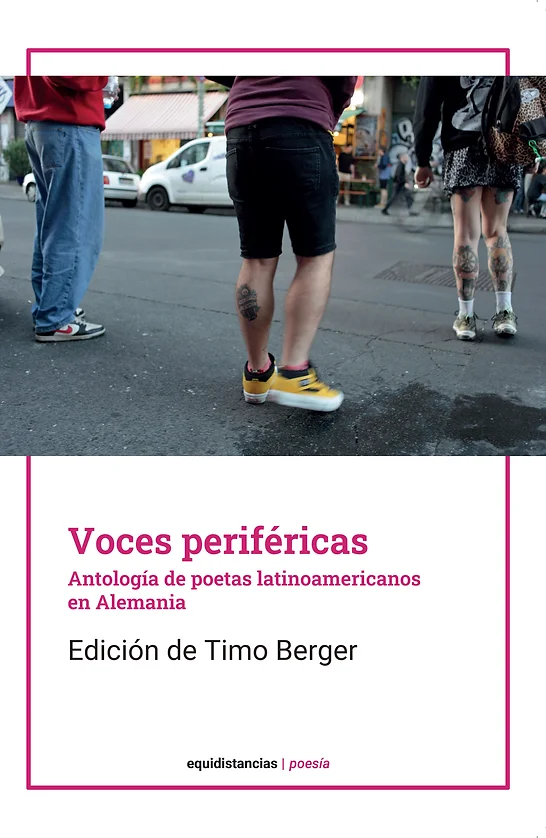

Making a Fire out of Despair, poetry as a territory for political action
Sprache im digitalen Zeitalter
Temporal Communities, FU Berlin, Literarischen Colloquium Berlin
(Berlin, 2023)
I
you are lost
today, after the end
there are no magical drawings
to save you
ignore the remaining borders
and institutions
inside and outside is not a logic
that belongs to this world
it’s not romantic
because romanticism
has been lost
for good
like many other
ideas maps beliefs
that were better to lose
you are lost
the only magic you will find
here
is the magic of lost words
that come back to say what they couldn’t before.
Sprache im digitalen Zeitalter
Temporal Communities, FU Berlin, Literarischen Colloquium Berlin
(Berlin, 2023)
I
you are lost
today, after the end
there are no magical drawings
to save you
ignore the remaining borders
and institutions
inside and outside is not a logic
that belongs to this world
it’s not romantic
because romanticism
has been lost
for good
like many other
ideas maps beliefs
that were better to lose
you are lost
the only magic you will find
here
is the magic of lost words
that come back to say what they couldn’t before.
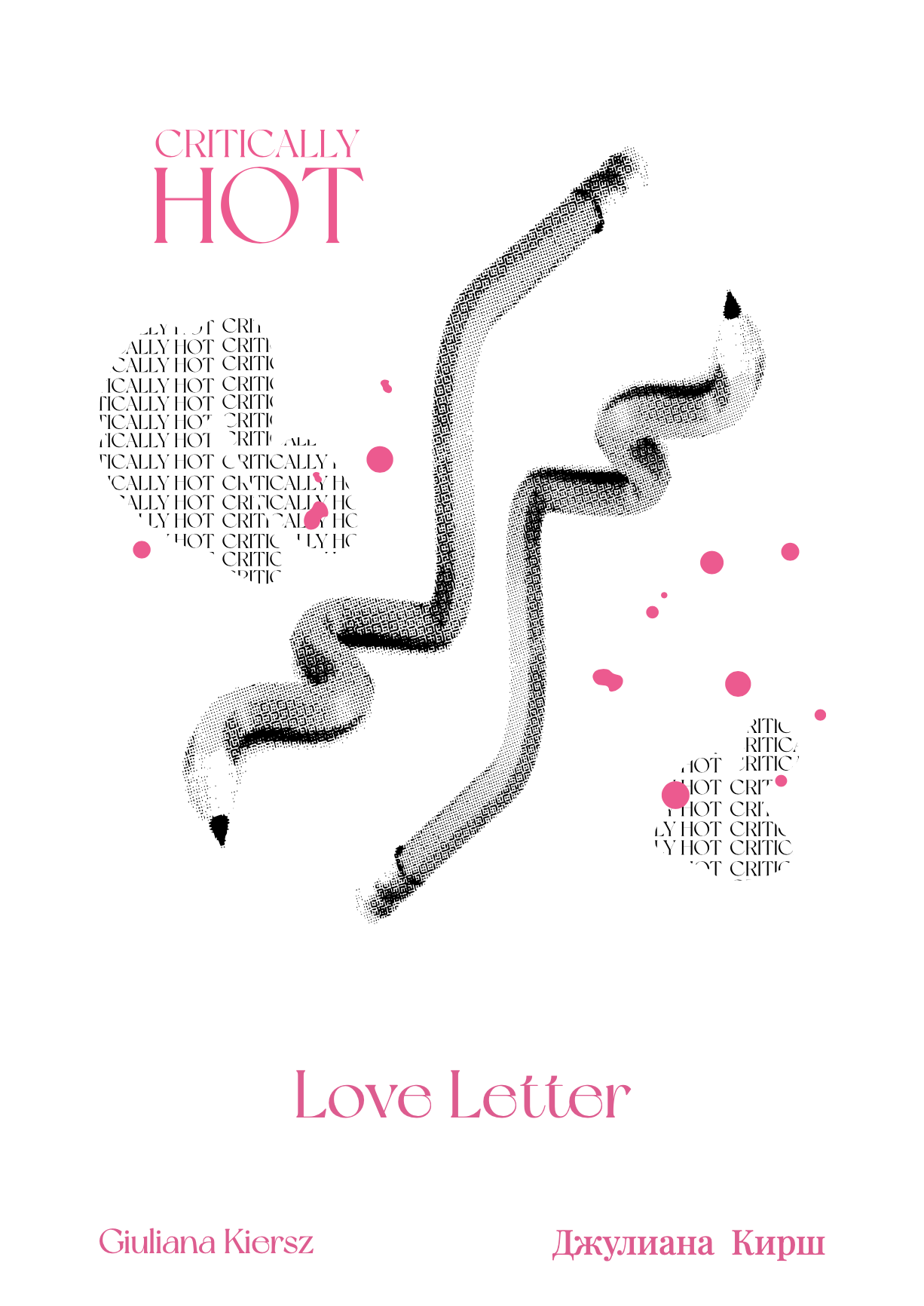
Love Letter
Critically HOT
(Bulgarien, 2024)
...
a love letter to men
who don't complain about condoms
to the bartender
who asked me if I was doing ok
to the shouting man who asked me
to guess his age
and to his age
which I don't know know
and don't care
to all the things I don’t care
and was asked about
the ones I had to learn
and couldn’t forget
a love letter to the rosemary in our balcony
to the plants that grew during spring
and got shattered by winter
to the mint and its seeds
and to the mint before the mint
to the pigeons that fell from the nest
and the naivety that made us think
that we could take care of them
to the hope that all pigeons will survive
and fight back
Critically HOT
(Bulgarien, 2024)
...
a love letter to men
who don't complain about condoms
to the bartender
who asked me if I was doing ok
to the shouting man who asked me
to guess his age
and to his age
which I don't know know
and don't care
to all the things I don’t care
and was asked about
the ones I had to learn
and couldn’t forget
a love letter to the rosemary in our balcony
to the plants that grew during spring
and got shattered by winter
to the mint and its seeds
and to the mint before the mint
to the pigeons that fell from the nest
and the naivety that made us think
that we could take care of them
to the hope that all pigeons will survive
and fight back
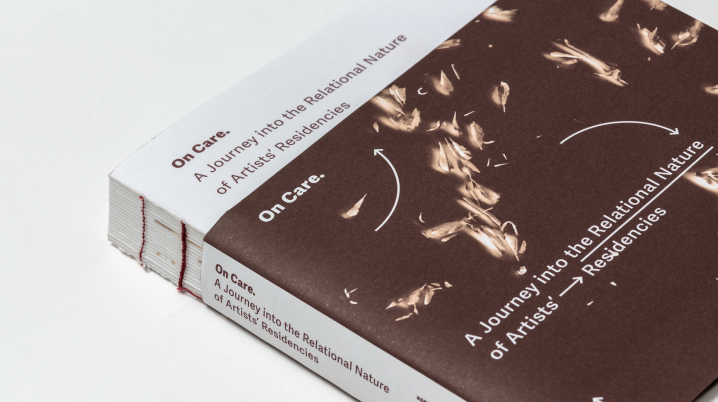
...
When we were lying
on the floor
that exhausting day
that we had dinner together
and peeled some oranges
and drank wine
and tea
and moved from one place to the other
and found ourselves surrounded by balloons
that day that
we argued
and laughed
and felt melancholic
because we don’t know what will happen
if it will be the same
that day
that we said
we are tired
and then
spent hours
talking about that book
When we were lying
on the floor
that exhausting day
that we had dinner together
and peeled some oranges
and drank wine
and tea
and moved from one place to the other
and found ourselves surrounded by balloons
that day that
we argued
and laughed
and felt melancholic
because we don’t know what will happen
if it will be the same
that day
that we said
we are tired
and then
spent hours
talking about that book
and the difference
between narcissism
and love
and we asked ourselves
what’s happening
and slowly
fell asleep on the floor
that day
you told us
that when you love someone
you love all of them
even if you don’t like some things
you still
love
all of them.
...
between narcissism
and love
and we asked ourselves
what’s happening
and slowly
fell asleep on the floor
that day
you told us
that when you love someone
you love all of them
even if you don’t like some things
you still
love
all of them.
...
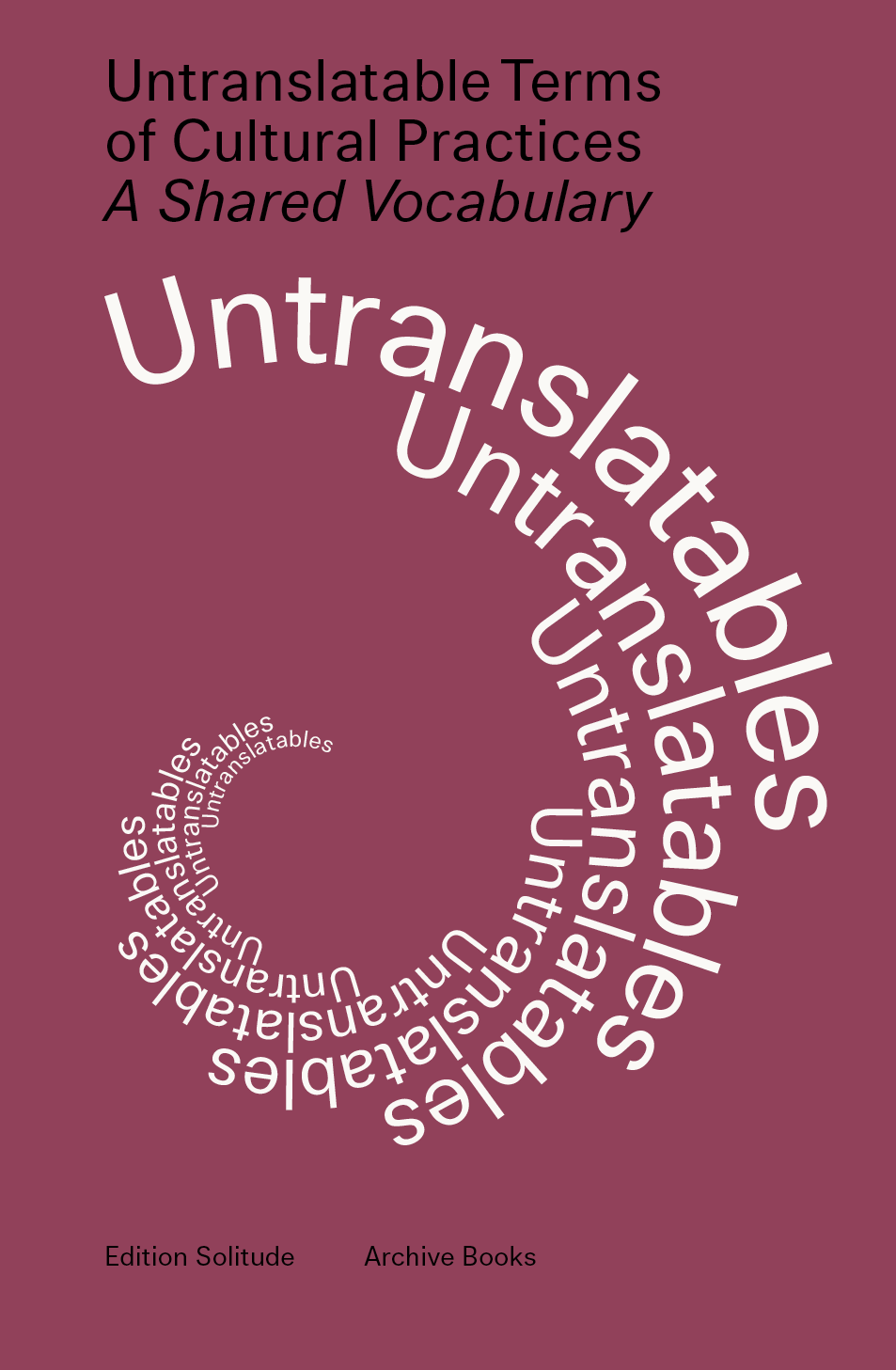
¡Tomá mate! Untranslatable terms of cultural practices
Untranslatable proposes a new vocabulary of terms that remain untranslated in their original language.these are words that convey cultural practices, attitudes and value systems and are explained from their respective language and word canon. Terms are presented that broaden perspectives, facilitate new perspectives, and thus enrich collective thinking as a global community. The shared vocabulary presents an expanded cultural and etymological understanding of the world and our cultural actions. This publication makes global knowledge systems visible and promotes the accessibility of valuable everyday practices.
Solitude Editions & Archive books
(Berlin, 2021)
Untranslatable proposes a new vocabulary of terms that remain untranslated in their original language.these are words that convey cultural practices, attitudes and value systems and are explained from their respective language and word canon. Terms are presented that broaden perspectives, facilitate new perspectives, and thus enrich collective thinking as a global community. The shared vocabulary presents an expanded cultural and etymological understanding of the world and our cultural actions. This publication makes global knowledge systems visible and promotes the accessibility of valuable everyday practices.
Solitude Editions & Archive books
(Berlin, 2021)
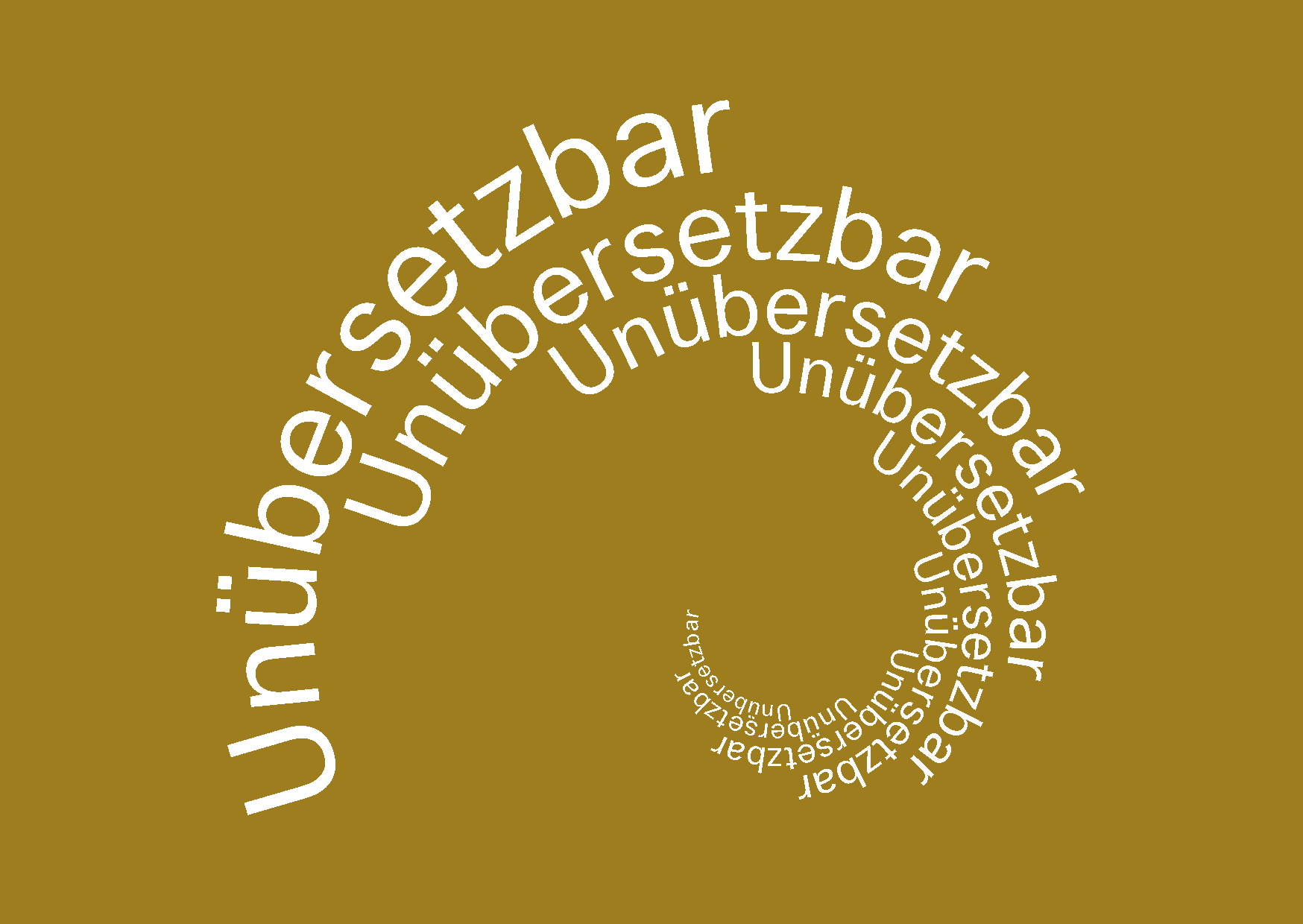
¡Tomá mate! Unübersetzbare Begriffe
Unübersetzbare Begriffe schlägt ein neues Vokabular von Begriffen vor, die in ihrer Sprache bestehen bleiben und nicht übersetzt werden. Es handelt sich um Wörter, die kulturelle Praktiken, Haltungen und Wertesysteme vermitteln und aus ihrem jeweiligen Sprach- und Wortkanon erklärt werden. Begriffe werden vorgestellt, die Perspektiven erweitern, neue Sichtweisen zulassen und damit das kollektive Denken als Weltgemeinschaft bereichern. Das Shared Vocabulary präsentiert ein erweitertes kulturelles und etymologisches Verständnis von Welt und unseren kulturellen Handlungen. Diese Publikation macht globale Wissenssysteme sichtbar und fördert die Zugänglichkeit wertvoller Alltagspraktiken.
Solitude Editions & Archive books
(Berlin, 2022)
Unübersetzbare Begriffe schlägt ein neues Vokabular von Begriffen vor, die in ihrer Sprache bestehen bleiben und nicht übersetzt werden. Es handelt sich um Wörter, die kulturelle Praktiken, Haltungen und Wertesysteme vermitteln und aus ihrem jeweiligen Sprach- und Wortkanon erklärt werden. Begriffe werden vorgestellt, die Perspektiven erweitern, neue Sichtweisen zulassen und damit das kollektive Denken als Weltgemeinschaft bereichern. Das Shared Vocabulary präsentiert ein erweitertes kulturelles und etymologisches Verständnis von Welt und unseren kulturellen Handlungen. Diese Publikation macht globale Wissenssysteme sichtbar und fördert die Zugänglichkeit wertvoller Alltagspraktiken.
Solitude Editions & Archive books
(Berlin, 2022)
El fin
X Premio Germán Rozenmacher
Libros del rojas
(Buenos Aires, 2017)
Dramaturgia joven
Fondo Editorial ENSAD
(Lima, 2020)
X Premio Germán Rozenmacher
Libros del rojas
(Buenos Aires, 2017)
Dramaturgia joven
Fondo Editorial ENSAD
(Lima, 2020)
I
El fin de las cosas nos acerca.
No sabemos qué queremos.
Sabemos qué no queremos.
No queremos que los edificios caigan.
No queremos que los puentes exploten.
No queremos que los autos sigan dando vueltas en el aire. No queremos que llueva.
No queremos ver agua en todo lo que vemos.
No queremos dejar de querernos.
Nos acercamos.
Y esperamos juntos.
Y el olor que sentimos a quemado es cada vez más fuerte y el cielo, más rojo.
Y no vemos hacia la ventana porque no queremos ver y nos acostamos y nos empezamos a sacar la ropa.
Nos acostamos desnudos.
Uno al lado del otro.
El fin del mundo nos vuelve románticos.
El fin de las cosas nos acerca.
No sabemos qué queremos.
Sabemos qué no queremos.
No queremos que los edificios caigan.
No queremos que los puentes exploten.
No queremos que los autos sigan dando vueltas en el aire. No queremos que llueva.
No queremos ver agua en todo lo que vemos.
No queremos dejar de querernos.
Nos acercamos.
Y esperamos juntos.
Y el olor que sentimos a quemado es cada vez más fuerte y el cielo, más rojo.
Y no vemos hacia la ventana porque no queremos ver y nos acostamos y nos empezamos a sacar la ropa.
Nos acostamos desnudos.
Uno al lado del otro.
El fin del mundo nos vuelve románticos.
I
La fin des choses nous rapproche.
Nous ne savons pas ce que nous voulons.
Nous savons ce que nous ne voulons pas.
Nous ne voulons pas que les immeubles s’écroulent.
Nous ne voulons pas que les ponts explosent.
Nous ne voulons pas que les voitures continuent à tourner dans l’air.
Nous ne voulons pas qu’il pleuve.
Nous ne voulons pas voir de l’eau dans tout ce que nous voyons. Nous ne voulons pas cesser de nous aimer.
Nous nous rapprochons.
Et nous attendons ensemble.
Et l’odeur de brûlé devient de plus en plus forte et le ciel, plus rouge. Et nous ne regardons pas vers la fenêtre parce que nous ne voulons pas voir et nous [nous couchons et nous commençons à ôter nos vêtements.
Nous nous couchons nus.
L’un à côté de l’autre.
La fin du monde nous rend romantiques.
La fin des choses nous rapproche.
Nous ne savons pas ce que nous voulons.
Nous savons ce que nous ne voulons pas.
Nous ne voulons pas que les immeubles s’écroulent.
Nous ne voulons pas que les ponts explosent.
Nous ne voulons pas que les voitures continuent à tourner dans l’air.
Nous ne voulons pas qu’il pleuve.
Nous ne voulons pas voir de l’eau dans tout ce que nous voyons. Nous ne voulons pas cesser de nous aimer.
Nous nous rapprochons.
Et nous attendons ensemble.
Et l’odeur de brûlé devient de plus en plus forte et le ciel, plus rouge. Et nous ne regardons pas vers la fenêtre parce que nous ne voulons pas voir et nous [nous couchons et nous commençons à ôter nos vêtements.
Nous nous couchons nus.
L’un à côté de l’autre.
La fin du monde nous rend romantiques.
I
The end of things brings us closer.
We don’t know what we want.
We know what we don ́t want.
We don’t want buildings to fall.
We don’t want bridges to explode.
We don’t want cars spinning out of control.
We don’t want rain.
We don’t want to see water in everything we see.
We don’t want to stop loving each other.
We bring ourselves close.
And we wait together.
And the burning smell becomes stronger and the sky, redder. And we don’t go towards the window because we don’t want to see and we lie down and we start taking our clothes off.
We lie down naked.
One next to the other.
The end of the world makes us romantic.
The end of things brings us closer.
We don’t know what we want.
We know what we don ́t want.
We don’t want buildings to fall.
We don’t want bridges to explode.
We don’t want cars spinning out of control.
We don’t want rain.
We don’t want to see water in everything we see.
We don’t want to stop loving each other.
We bring ourselves close.
And we wait together.
And the burning smell becomes stronger and the sky, redder. And we don’t go towards the window because we don’t want to see and we lie down and we start taking our clothes off.
We lie down naked.
One next to the other.
The end of the world makes us romantic.

I
Estoy sola.
En algún lugar en una ruta igual de principio a fin.
Hace días que camino.
Salí cuando todavía hacía frío y el otoño se alejaba.
Ahora ya volvieron las flores.
Campo a los costados. Adelante. Atrás.
Sigo parada en la ruta sin saber a dónde ir.
No estoy pensando. Tengo que pensar un poco.
Un auto pasa rápido por la ruta.
Tengo que ponerme a pensar y pienso en si fumarme o no un cigarrillo.
Y decido que sí.
Pero no tengo cigarrillos.
Y no hay ningún lugar cerca.
Todo a mi alrededor es verde o asfalto.
Y desisto en la idea de fumarme un cigarrillo.
Un hombre que aparece andando en bicicleta.
Tengo una conversación con él.
Le pregunto si sabe para dónde queda A, el lugar al que quiero ir.
Me dice que no, que estoy yendo a B, un lugar del que nunca había escuchado hablar.
Estoy sola.
En algún lugar en una ruta igual de principio a fin.
Hace días que camino.
Salí cuando todavía hacía frío y el otoño se alejaba.
Ahora ya volvieron las flores.
Campo a los costados. Adelante. Atrás.
Sigo parada en la ruta sin saber a dónde ir.
No estoy pensando. Tengo que pensar un poco.
Un auto pasa rápido por la ruta.
Tengo que ponerme a pensar y pienso en si fumarme o no un cigarrillo.
Y decido que sí.
Pero no tengo cigarrillos.
Y no hay ningún lugar cerca.
Todo a mi alrededor es verde o asfalto.
Y desisto en la idea de fumarme un cigarrillo.
Un hombre que aparece andando en bicicleta.
Tengo una conversación con él.
Le pregunto si sabe para dónde queda A, el lugar al que quiero ir.
Me dice que no, que estoy yendo a B, un lugar del que nunca había escuchado hablar.
I
Je suis seule. Quelque part sur une route semblable du début à la fin.
Je marche depuis des jours.
Quand je suis partie, il faisait encore froid, et l’automne s’en allait.
Maintenant les fleurs sont déjà revenues.
De chaque côté la campagne. Devant. Derrière.
Je demeure immobile sur la route sans savoir où aller.
Je ne pense pas. Il faut que je pense un peu.
Une voiture passe très vite sur la route.
Je dois me mettre à penser et je pense à fumer ou non une cigarette.
Et je décide que oui.
Mais je n’ai pas de cigarettes.
Et il n’y a rien dans les parages.
Autour de moi tout est vert ou asphalte.
Je reviens sur l’idée de fumer une cigarette.
Un homme arrive sur un vélo.
Nous engageons une conversation.
Je lui demande s’il sait où se trouve A, l’endroit où je veux aller.
Il me dit que non, que je me dirige vers B, un lieu dont je n’ai jamais entendu parler
Je suis seule. Quelque part sur une route semblable du début à la fin.
Je marche depuis des jours.
Quand je suis partie, il faisait encore froid, et l’automne s’en allait.
Maintenant les fleurs sont déjà revenues.
De chaque côté la campagne. Devant. Derrière.
Je demeure immobile sur la route sans savoir où aller.
Je ne pense pas. Il faut que je pense un peu.
Une voiture passe très vite sur la route.
Je dois me mettre à penser et je pense à fumer ou non une cigarette.
Et je décide que oui.
Mais je n’ai pas de cigarettes.
Et il n’y a rien dans les parages.
Autour de moi tout est vert ou asphalte.
Je reviens sur l’idée de fumer une cigarette.
Un homme arrive sur un vélo.
Nous engageons une conversation.
Je lui demande s’il sait où se trouve A, l’endroit où je veux aller.
Il me dit que non, que je me dirige vers B, un lieu dont je n’ai jamais entendu parler
Isabel I, Teatro XV
Tercer premio del Concurso Nacional de Dramaturgia del Instituto Nacional de Teatro
Editorial INTeatro
(Buenos Aires, 2014)
Tercer premio del Concurso Nacional de Dramaturgia del Instituto Nacional de Teatro
Editorial INTeatro
(Buenos Aires, 2014)
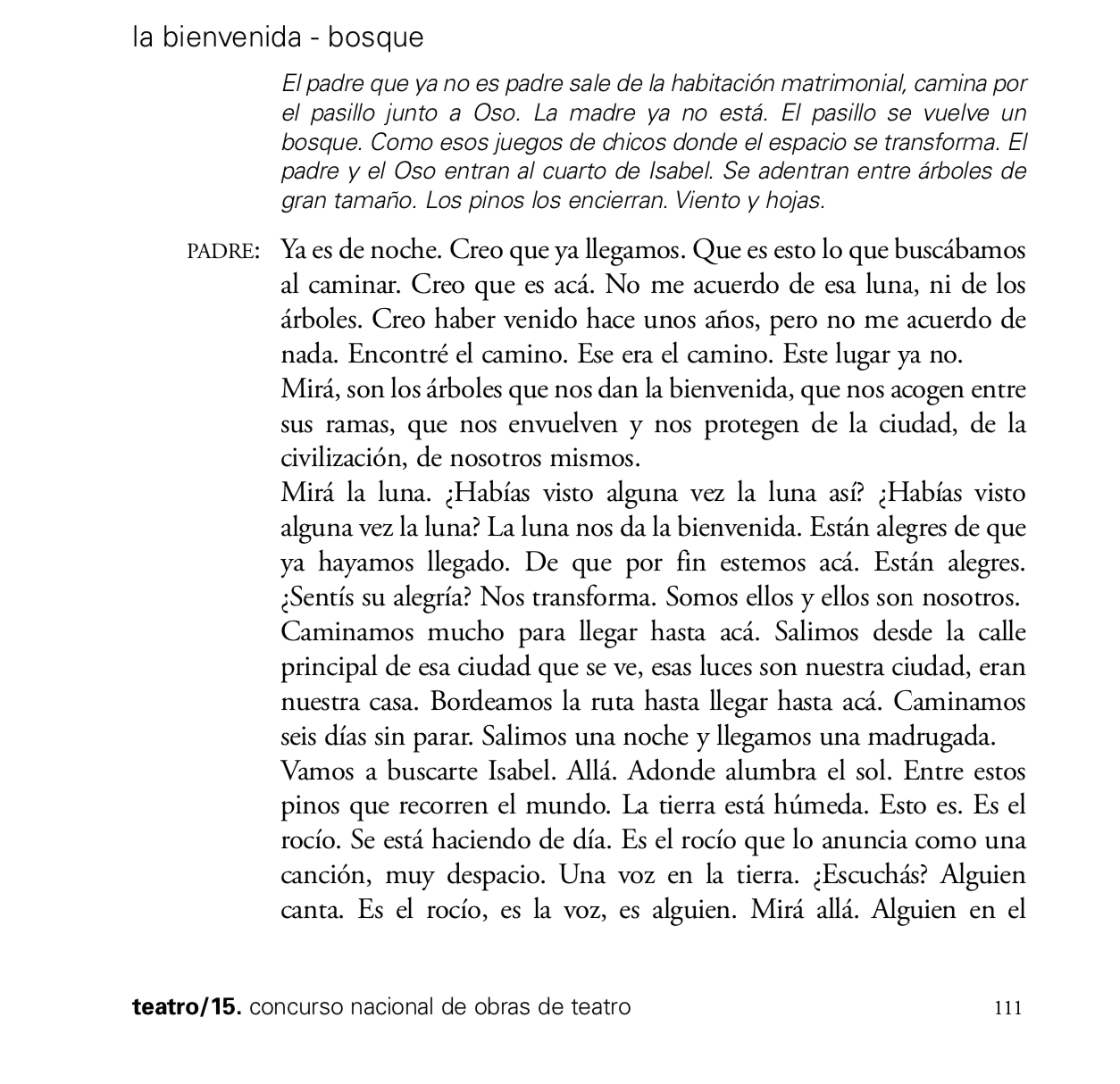
Una casa a dónde volver, Fuera del canon, poemas
Ediciones del Espejo Somos
(San Cristóbal de las Casas, 2020)
Ediciones del Espejo Somos
(San Cristóbal de las Casas, 2020)
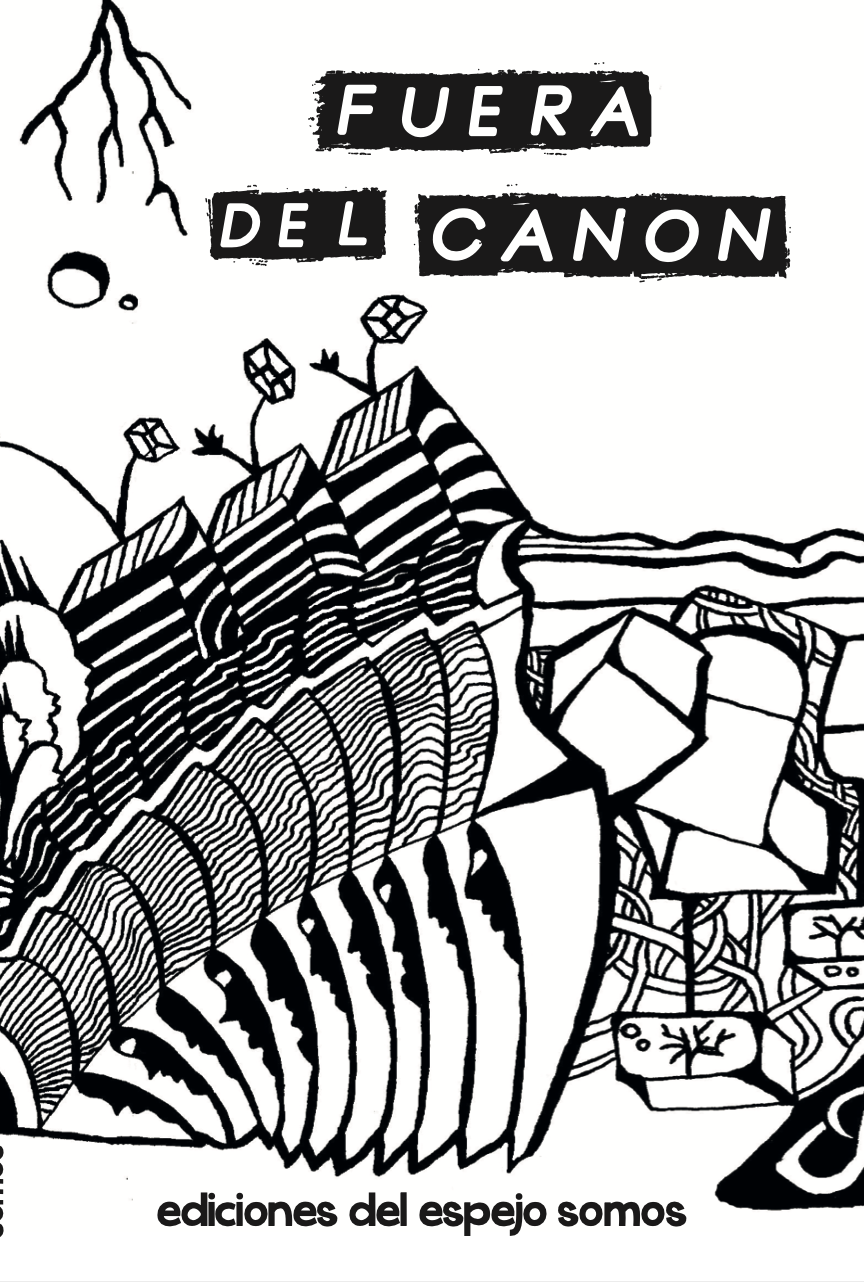
Lo que duele
I
duele irse
y duele volver
Erica se sentó en el apoyabrazos
para decir: pienso en cosas superficiales
en colores
vestidos porque sino
sino no puedo
y todas
pensamos en colores
vestidos
porque sino
sino
Santi dijo algo
sobre las formas de habitar el mundo y las amigas
hay maneras tan diversas
me dice
te siento sentada hablándome
yo camino por las cuadras que aprendí
estos años de distancia
porque adentro no me escucho
y más allá me pierdo
salgo a conocer una ciudad
que decidí hacer propia
entre el agua y el parque que me espera cuando estoy triste
I
duele irse
y duele volver
Erica se sentó en el apoyabrazos
para decir: pienso en cosas superficiales
en colores
vestidos porque sino
sino no puedo
y todas
pensamos en colores
vestidos
porque sino
sino
Santi dijo algo
sobre las formas de habitar el mundo y las amigas
hay maneras tan diversas
me dice
te siento sentada hablándome
yo camino por las cuadras que aprendí
estos años de distancia
porque adentro no me escucho
y más allá me pierdo
salgo a conocer una ciudad
que decidí hacer propia
entre el agua y el parque que me espera cuando estoy triste
a recordar que ahí siguen
los patos y los cuervos
las bicicletas robadas
las familias cansadas del invierno
todo eso que pensamos que queríamos
y un día decidimos abandonar
como abandonamos casas
amigos
deseos
ideas
nos fuimos deshaciendo
de otras pieles
Ceci dice: Berlín es una ciudad de almas en pena
de quiénes buscan
de quiénes se desnudaron
y todavía no saben
no pueden
no quieren
volver
el resto sigue ahí
el hombre que olía las flores
la mujer que lloraba en el teatro
las adolescentes que cantaban
todo está acá adentro.
Alba lateinamerika lesen 14°
(Berlin, 2023)
los patos y los cuervos
las bicicletas robadas
las familias cansadas del invierno
todo eso que pensamos que queríamos
y un día decidimos abandonar
como abandonamos casas
amigos
deseos
ideas
nos fuimos deshaciendo
de otras pieles
Ceci dice: Berlín es una ciudad de almas en pena
de quiénes buscan
de quiénes se desnudaron
y todavía no saben
no pueden
no quieren
volver
el resto sigue ahí
el hombre que olía las flores
la mujer que lloraba en el teatro
las adolescentes que cantaban
todo está acá adentro.
Alba lateinamerika lesen 14°
(Berlin, 2023)
Das Ende
I
Das Ende der Dinge bringt uns zusammen.
Wir wissen nicht, was wir wollen.
Wir wissen nur, was wir nicht wollen.
Dass Gebäude einstürzen.
Dass Brücken explodieren.
Dass Autos sich in der Luft überschlagen.
Dass es regnet.
Dass wir in allem, was wir sehen, Wasser sehen.
Dass wir aufhören, uns zu lieben.
Wir kommen zusammen.
Und warten gemeinsam.
Der Brandgeruch wird immer stärker, der
Himmel röter.
Aber wir blicken nicht zum Fenster, weil wir es nicht sehen wollen, und wir
legen uns hin und ziehen uns die Kleider aus.
Wir legen uns nackt hin.
Seite an Seite.
Das Ende der Welt macht uns romantisch.
Übersetzung: Timo Berger
Lateinamerika Nachrichten
(Berlin, 2023)
I
Das Ende der Dinge bringt uns zusammen.
Wir wissen nicht, was wir wollen.
Wir wissen nur, was wir nicht wollen.
Dass Gebäude einstürzen.
Dass Brücken explodieren.
Dass Autos sich in der Luft überschlagen.
Dass es regnet.
Dass wir in allem, was wir sehen, Wasser sehen.
Dass wir aufhören, uns zu lieben.
Wir kommen zusammen.
Und warten gemeinsam.
Der Brandgeruch wird immer stärker, der
Himmel röter.
Aber wir blicken nicht zum Fenster, weil wir es nicht sehen wollen, und wir
legen uns hin und ziehen uns die Kleider aus.
Wir legen uns nackt hin.
Seite an Seite.
Das Ende der Welt macht uns romantisch.
Übersetzung: Timo Berger
Lateinamerika Nachrichten
(Berlin, 2023)
Obras - Works of art
Making a fire out of despair
What stories do we need to move our social and political horizons? What languages? What words? Making a fire out of despair, poetry as a territory for political action is an invitation to transform our languages. Through a series of writing gathering it aims to reflect on the ideas, structures and beliefs that inhabit our words in order to transform how we name the world and ourselves. In collaboration with CargoCult, our writings will be exhibited and shared throughout the festival, creating an installation for visitors to read and engage with. Working from the possibility of “the end of books”, we will reconceptualize words, imagine meanings and collectively write a new beginning for our societies.
Photos by Andrea Huyoff
Assemblage Berlin. 60 Jahre Literatur intermedial, Literarischen Colloquium
(Berlin, 2023)
What stories do we need to move our social and political horizons? What languages? What words? Making a fire out of despair, poetry as a territory for political action is an invitation to transform our languages. Through a series of writing gathering it aims to reflect on the ideas, structures and beliefs that inhabit our words in order to transform how we name the world and ourselves. In collaboration with CargoCult, our writings will be exhibited and shared throughout the festival, creating an installation for visitors to read and engage with. Working from the possibility of “the end of books”, we will reconceptualize words, imagine meanings and collectively write a new beginning for our societies.
Photos by Andrea Huyoff
Assemblage Berlin. 60 Jahre Literatur intermedial, Literarischen Colloquium
(Berlin, 2023)
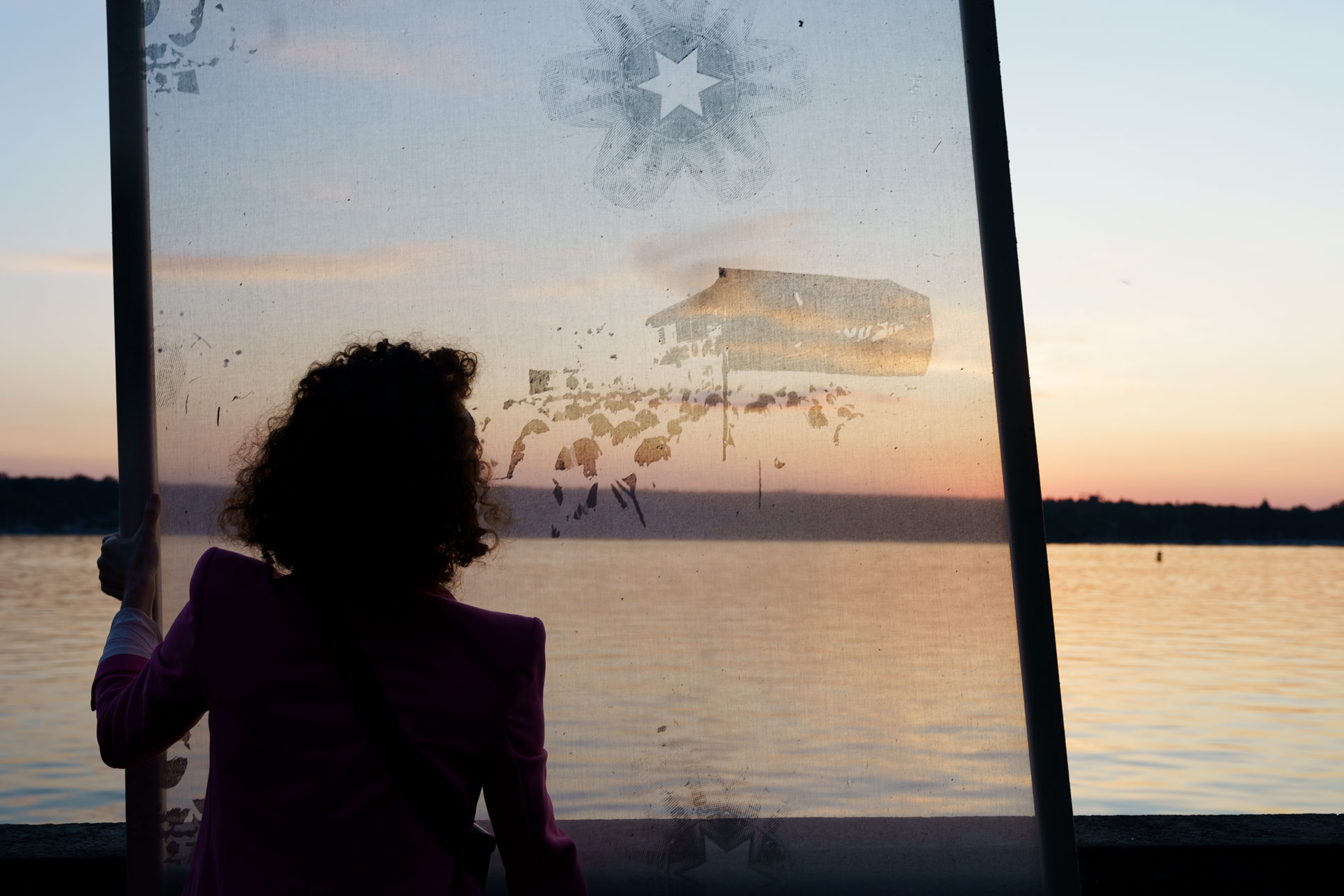
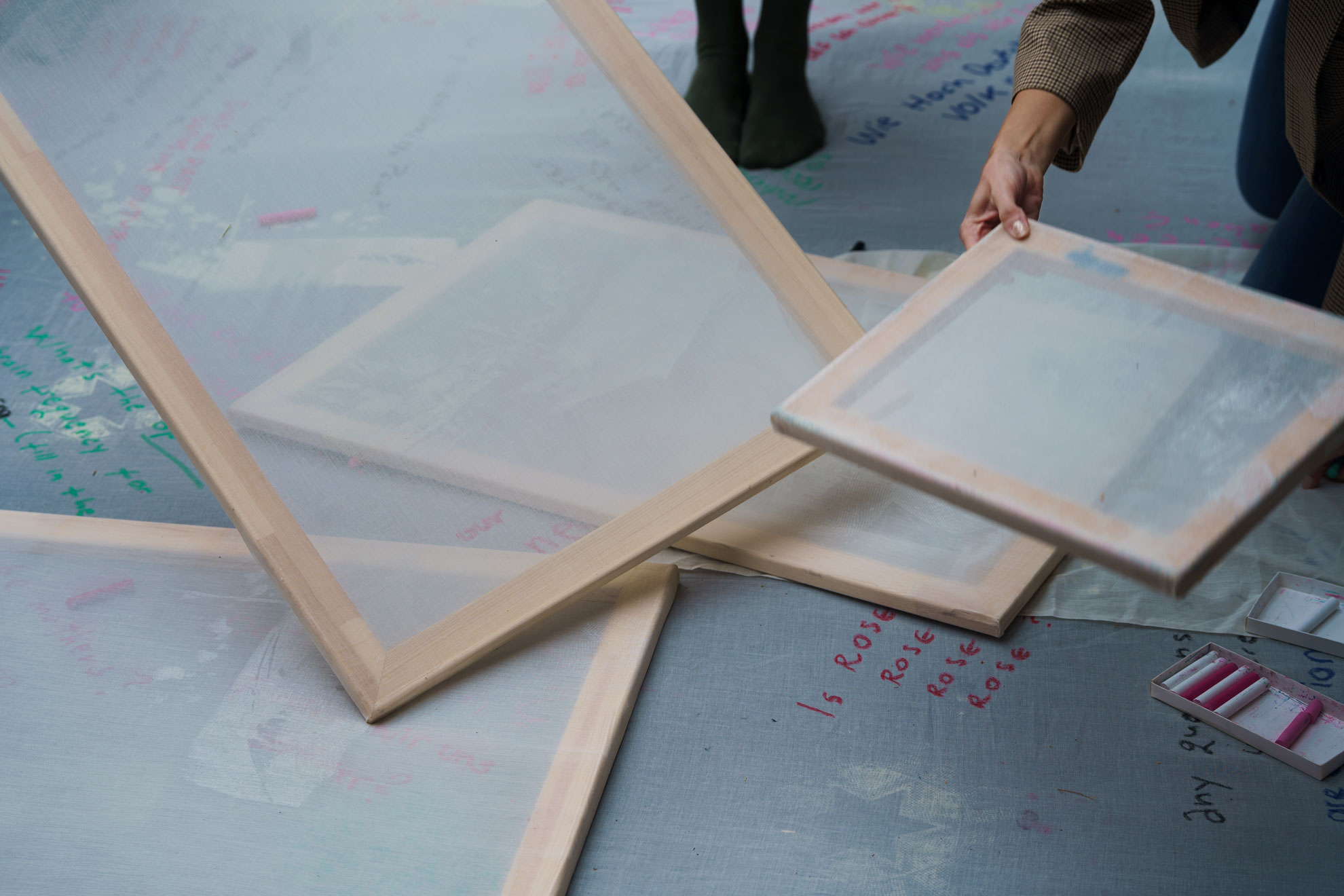
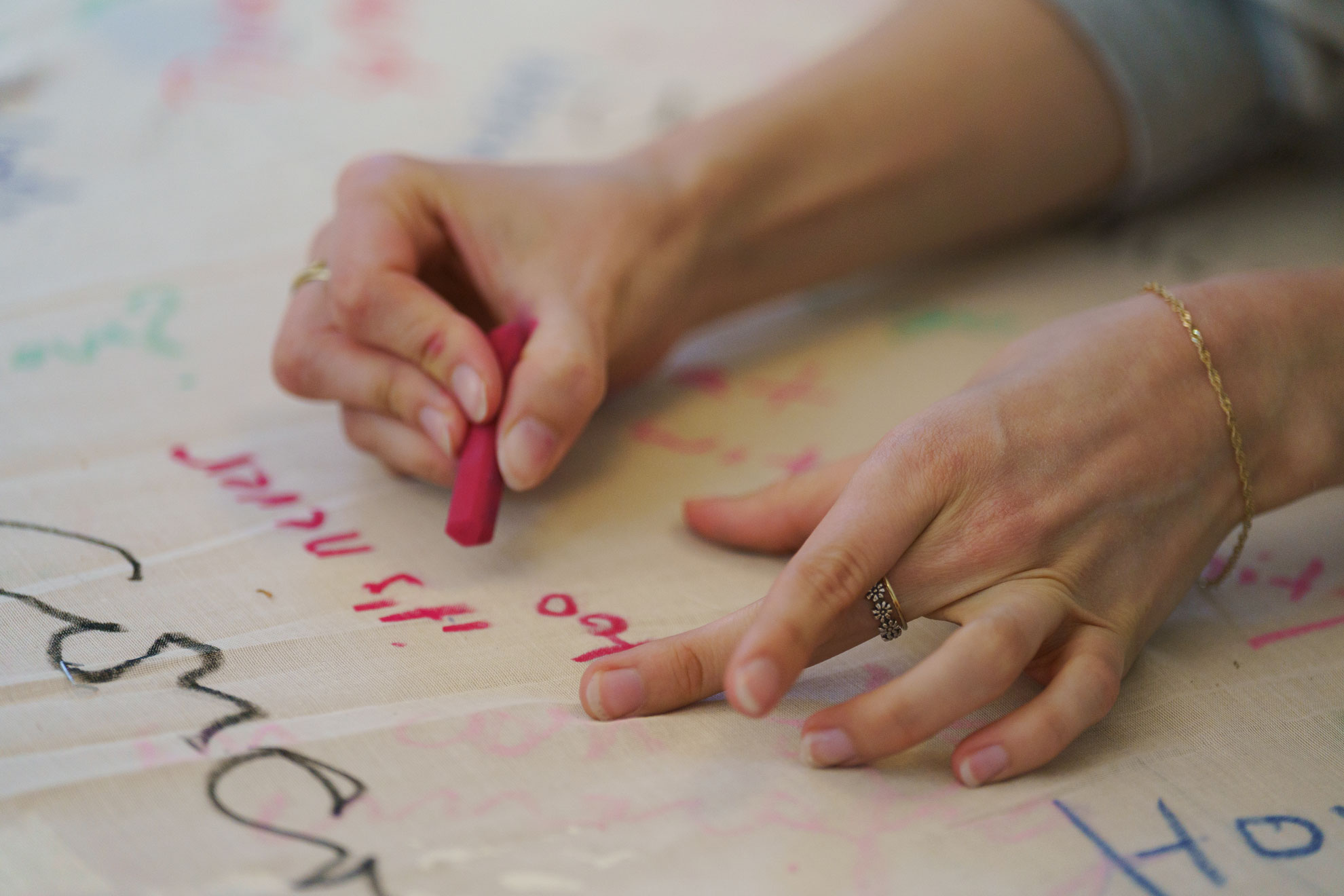
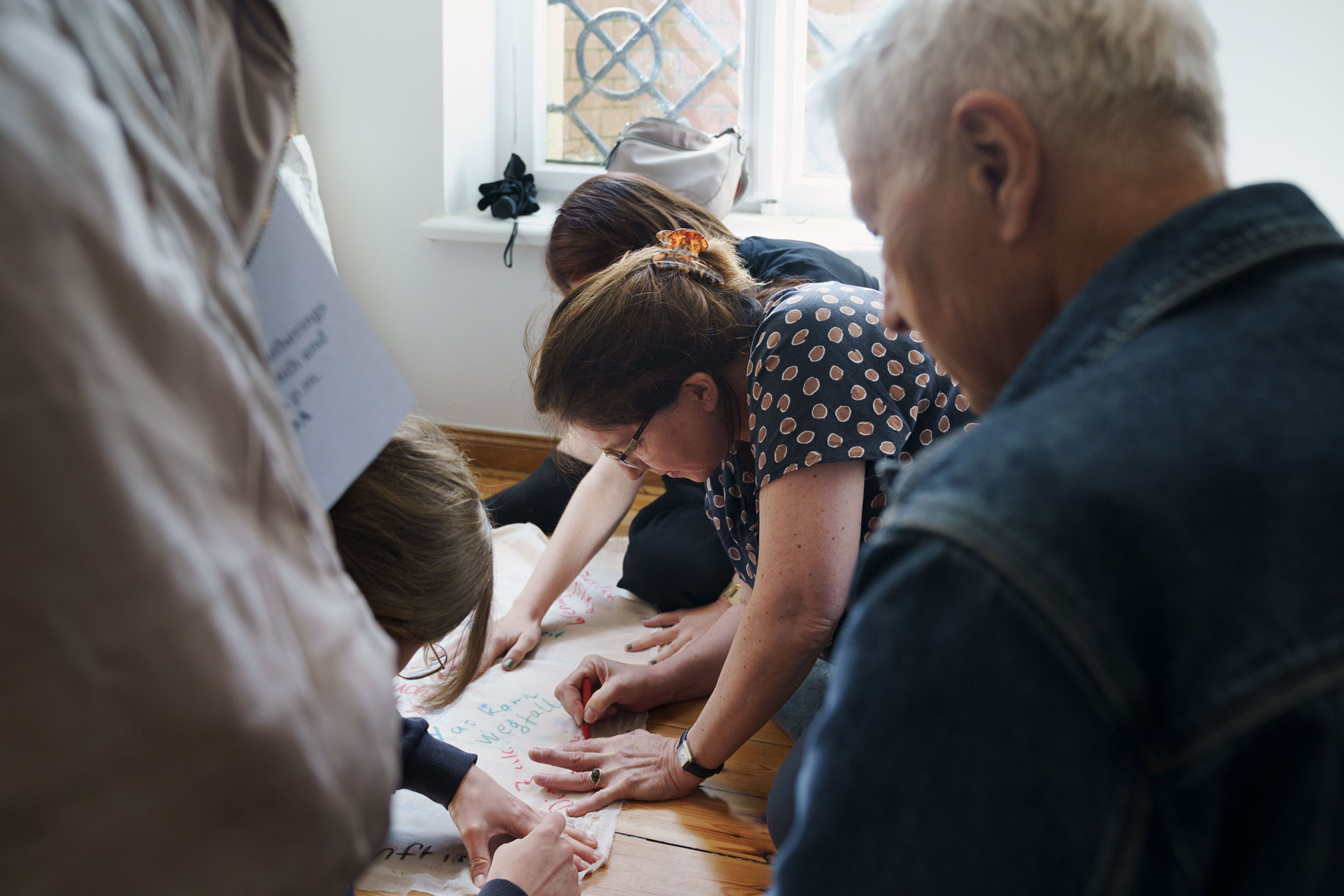
Un museo
Feminist audio guide for an ethnographic museum
What lies behind an object, behind an exhibition hall, behind a museum, behind a voice? It was written from encounters and interviews with people working at the institution around the status of the collections and the aims of the Linden-Museum, Un museo takes the format of an audio guide that often creates a sense of truth and displays a hierarchy to transform it from and into a feminist space where to reflect on the role of museums in post-colonial times. It raises the question: What does a museum say about the society where it exists?
Idea, text and voice in Spanish, English and German: Giuliana Kiersz
Translation to English: William Gregory
Translation to German: Timo Berger
Sound design: Ben Osborn
Linden-Museum
(Stuttgart, 2021 - 2023)
Feminist audio guide for an ethnographic museum
What lies behind an object, behind an exhibition hall, behind a museum, behind a voice? It was written from encounters and interviews with people working at the institution around the status of the collections and the aims of the Linden-Museum, Un museo takes the format of an audio guide that often creates a sense of truth and displays a hierarchy to transform it from and into a feminist space where to reflect on the role of museums in post-colonial times. It raises the question: What does a museum say about the society where it exists?
Idea, text and voice in Spanish, English and German: Giuliana Kiersz
Translation to English: William Gregory
Translation to German: Timo Berger
Sound design: Ben Osborn
Linden-Museum
(Stuttgart, 2021 - 2023)
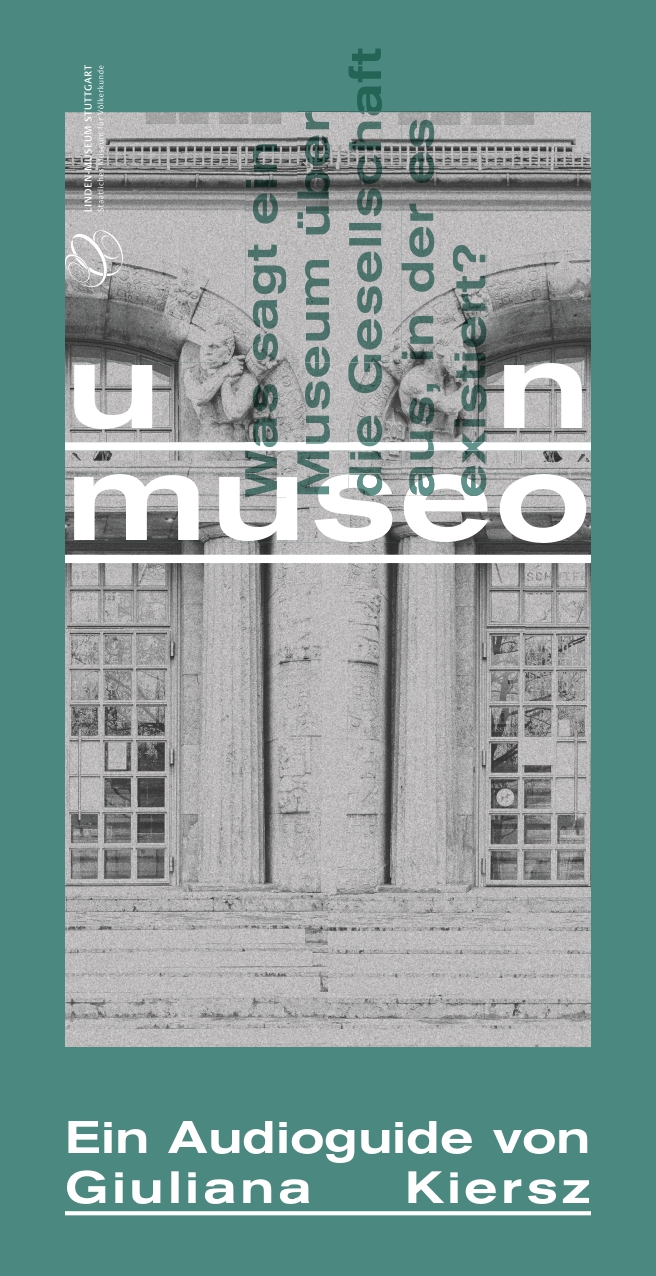
a museum is a space with walls
a museum is a thing that has other things inside it
a museum is an inheritance
a museum is a curse
a museum is the conservation of the world
a museum is a colonial institution
a museum is an act of faith
a museum is the loss of meaning
a museum is the perfect plan for a rainy sunday
a museum is
a place to think in
a place to cry in
a place to occupy
a museum is a thing that has other things inside it
a museum is an inheritance
a museum is a curse
a museum is the conservation of the world
a museum is a colonial institution
a museum is an act of faith
a museum is the loss of meaning
a museum is the perfect plan for a rainy sunday
a museum is
a place to think in
a place to cry in
a place to occupy
ein museum ist ein raum mit wänden
ein museum ist ein ding, das andere dinge enthält
ein museum ist ein erbe
ein museum ist ein fluch
ein museum bewahrt die welt auf
ein museum ist eine koloniale institution
ein museum ist ein akt des glaubens
ein museum ist der verlust von bedeutung
ein museum ist der perfekte plan für einen regensonntag
ein museum ist
ein ort zum nachdenken
ein ort zum weinen
ein ort, um ihn einzunehmen
ein museum ist ein ding, das andere dinge enthält
ein museum ist ein erbe
ein museum ist ein fluch
ein museum bewahrt die welt auf
ein museum ist eine koloniale institution
ein museum ist ein akt des glaubens
ein museum ist der verlust von bedeutung
ein museum ist der perfekte plan für einen regensonntag
ein museum ist
ein ort zum nachdenken
ein ort zum weinen
ein ort, um ihn einzunehmen
un museo es un espacio con paredes
un museo es una cosa que tiene otras cosas adentro
un museo es una herencia
un museo es una maldición
un museo es la conservación del mundo
un museo es una institución colonial
un museo es un acto de fé
un museo es la pérdida de sentido
un museo es el plan perfecto para un domingo de lluvia
un museo es
un lugar para pensar
un lugar para llorar
un lugar a ocupar
un museo es una cosa que tiene otras cosas adentro
un museo es una herencia
un museo es una maldición
un museo es la conservación del mundo
un museo es una institución colonial
un museo es un acto de fé
un museo es la pérdida de sentido
un museo es el plan perfecto para un domingo de lluvia
un museo es
un lugar para pensar
un lugar para llorar
un lugar a ocupar
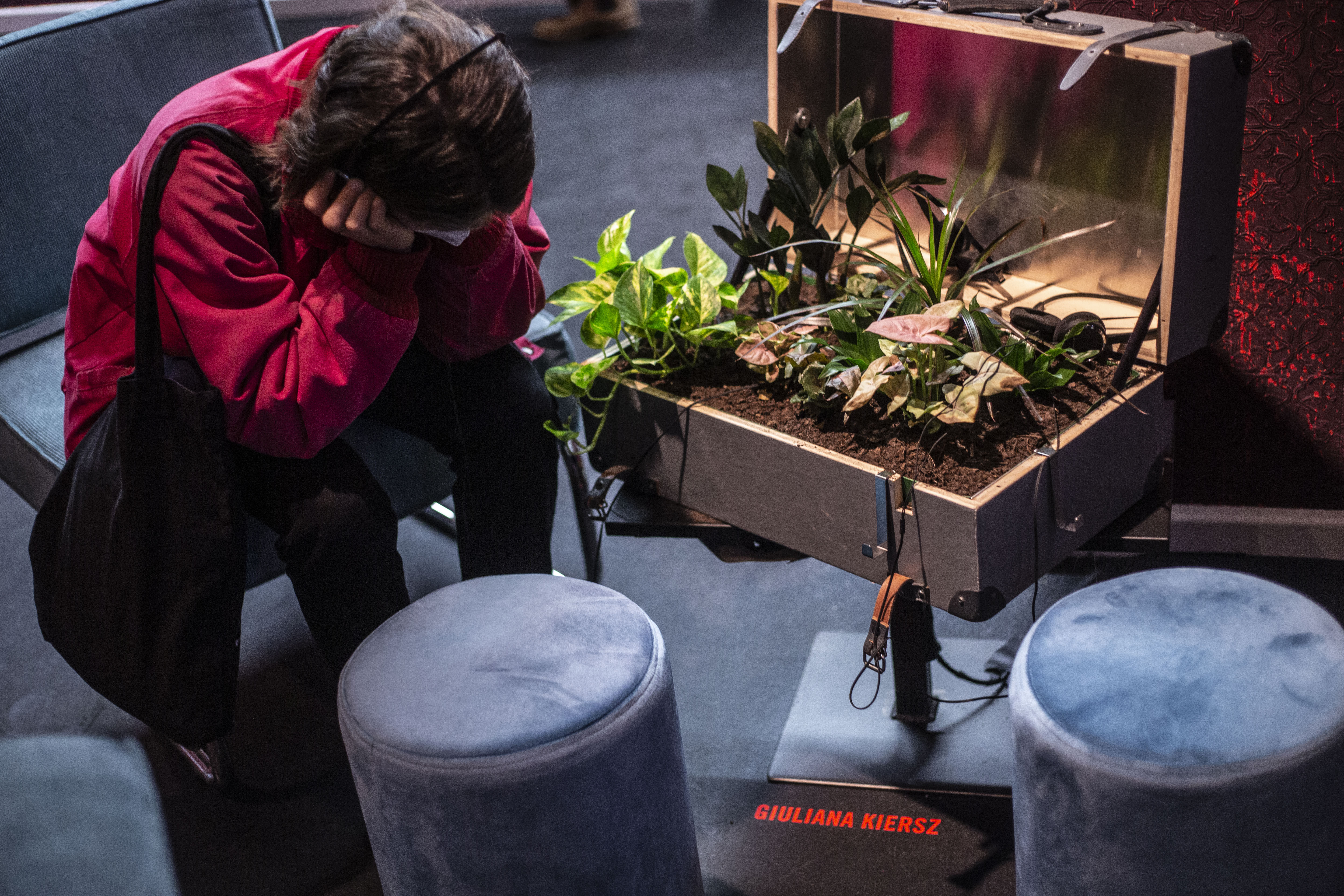
A mis amigas
The curator's suitcase, 5. Berliner Herbstsalon, Maxim Gorki Theater (Berlin, 2022)
The curator's suitcase, 5. Berliner Herbstsalon, Maxim Gorki Theater (Berlin, 2022)
...
Desde que camino
por tierras
extranjeras
buscando
un pedazo
de tierra
para dejar
mis tristezas
respuestas
entre las hojas
el viento
los lagos
desde que me ahogo
con los días de sol
son las voces
de mis amigas
las que me acompañan
se ríen
se enojan
me abrazan
desde otros continentes
hemisferios
a cualquier hora
entre los parques
cerca del agua
desde los árboles
las asesoras invisibles
me dicen
respirá
no renuncies
disfrutá
no destruyas todo
dale tiempo
no pienses
en lo que deberías contar
...
Desde que camino
por tierras
extranjeras
buscando
un pedazo
de tierra
para dejar
mis tristezas
respuestas
entre las hojas
el viento
los lagos
desde que me ahogo
con los días de sol
son las voces
de mis amigas
las que me acompañan
se ríen
se enojan
me abrazan
desde otros continentes
hemisferios
a cualquier hora
entre los parques
cerca del agua
desde los árboles
las asesoras invisibles
me dicen
respirá
no renuncies
disfrutá
no destruyas todo
dale tiempo
no pienses
en lo que deberías contar
...
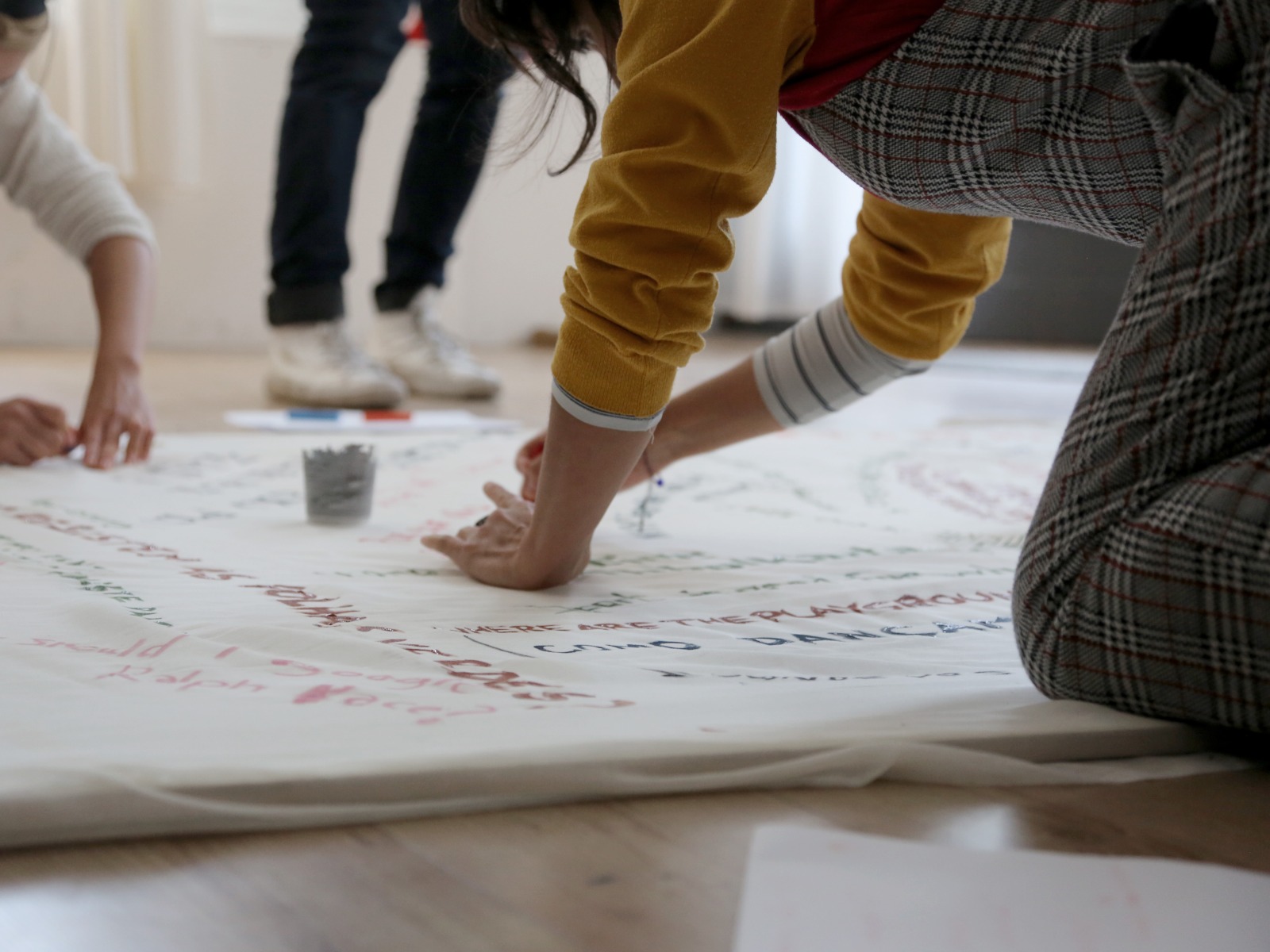
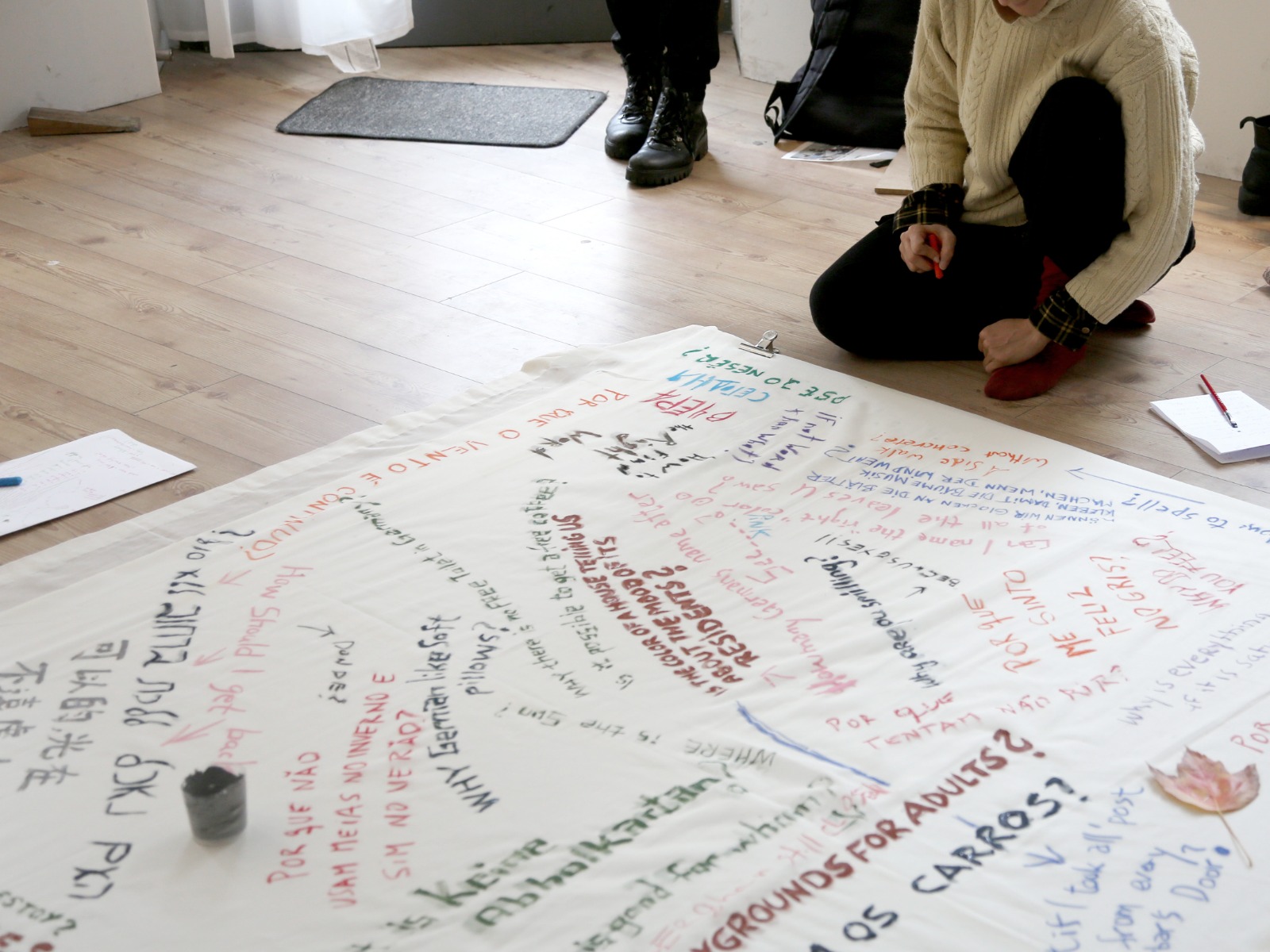
Spaces with words, words for fantasies
Solo exhibition
Spaces with words, words for fantasies is an exhibition around the project Encuentros de escritura - Writing gatherings (2017 - ongoing). The writing gatherings are sensitive and political spaces where to reflect collectively on the territories we inhabit to create new narrative structures for the society we want to live in. By investigating our relationship with language, we intend to expand the dimensions of words so as to perceive beyond our ideas of what exists. We practice writing as a form of allowing sensitive knowledge to arise from listening, collecting and thinking together.
Prenzlauer Studio, Kunst-Kollectiv
(Berlín, 2021)
Solo exhibition
Spaces with words, words for fantasies is an exhibition around the project Encuentros de escritura - Writing gatherings (2017 - ongoing). The writing gatherings are sensitive and political spaces where to reflect collectively on the territories we inhabit to create new narrative structures for the society we want to live in. By investigating our relationship with language, we intend to expand the dimensions of words so as to perceive beyond our ideas of what exists. We practice writing as a form of allowing sensitive knowledge to arise from listening, collecting and thinking together.
Prenzlauer Studio, Kunst-Kollectiv
(Berlín, 2021)
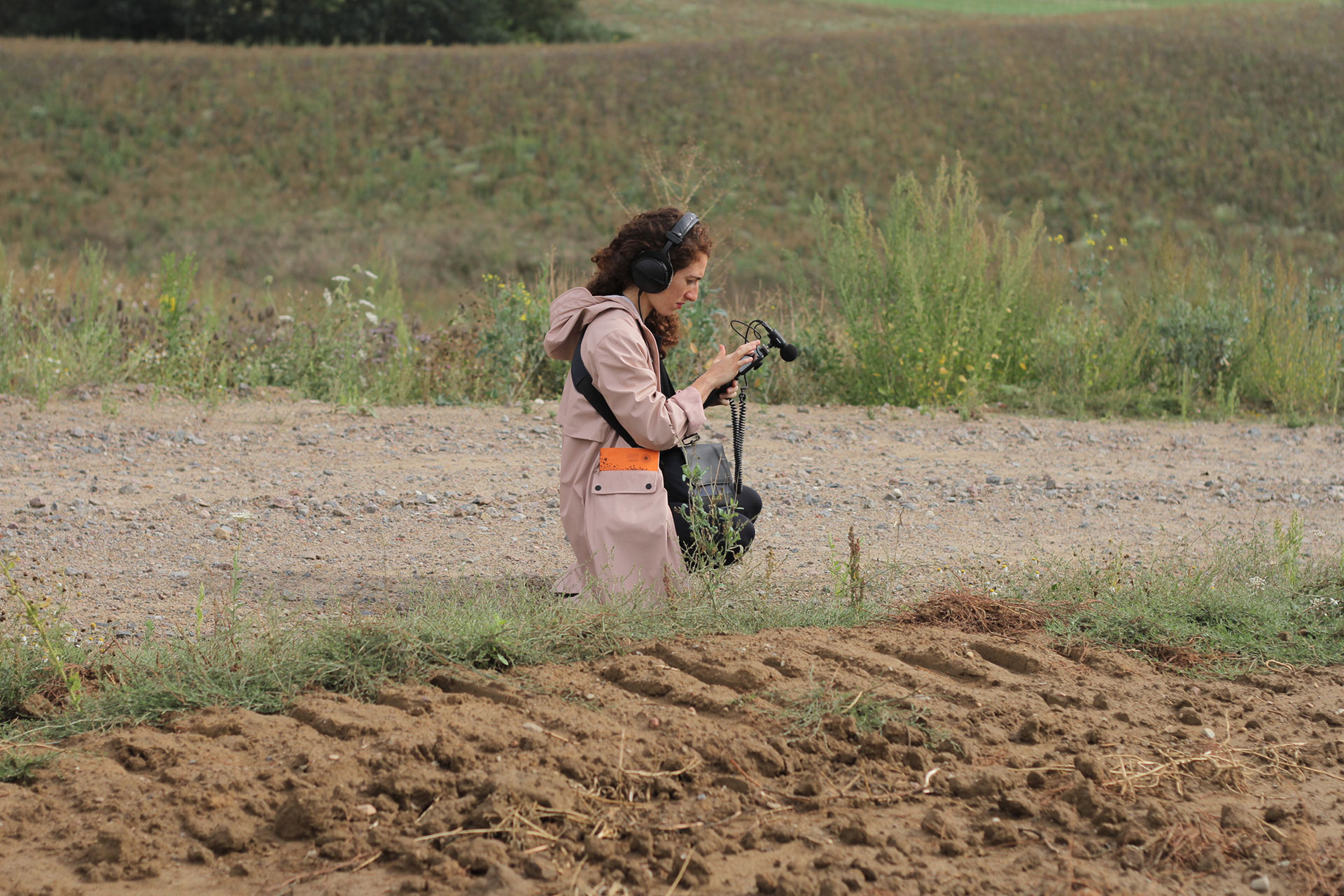
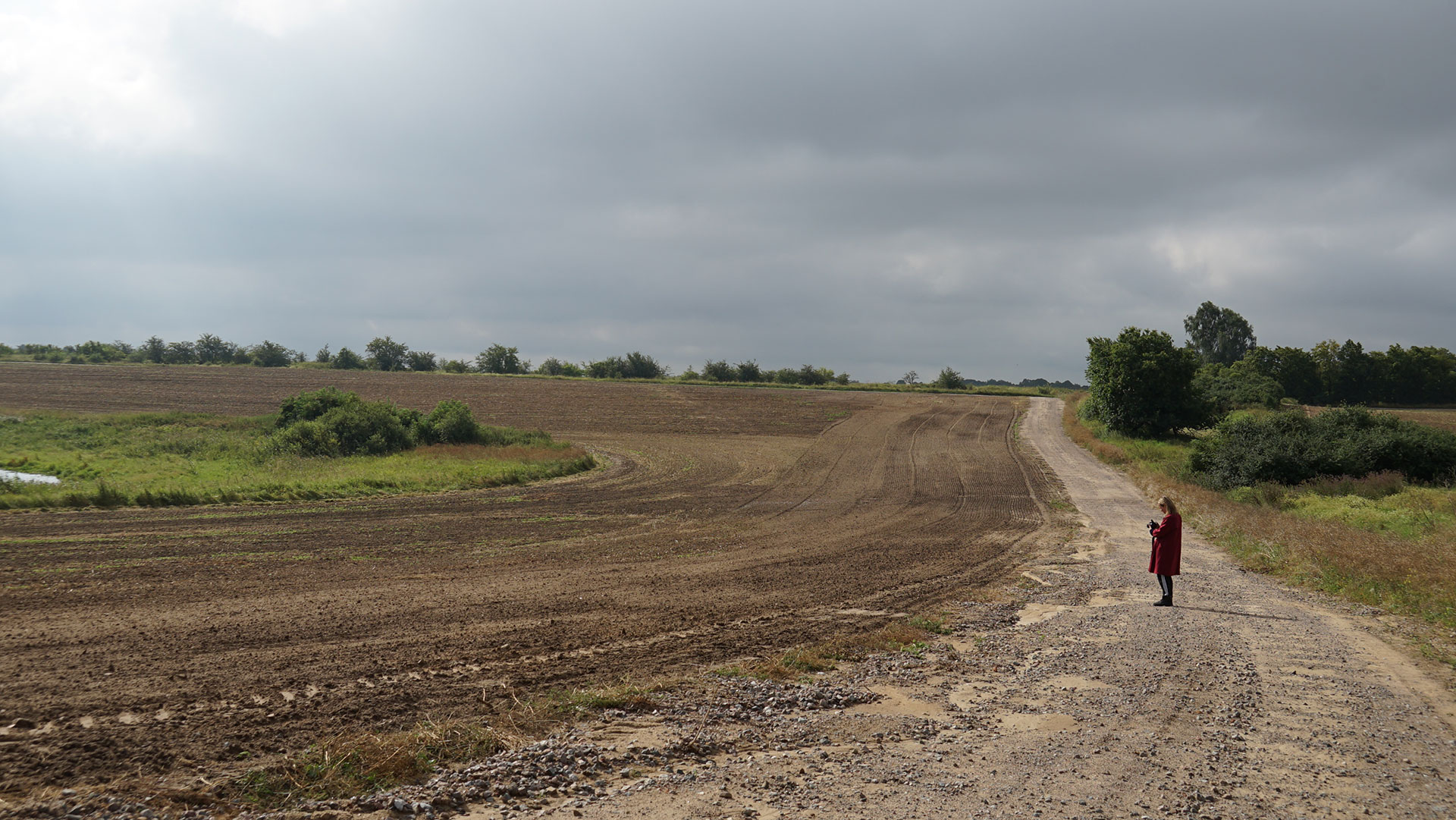
Map of empty space
Digital and physical map
Taking its position from the point at which the Brandenburg and Mecklenburg-Vorpommern state borders reach the German-Polish border, the map of empty space explores this sparse rural landscape to reveal the stories - both human and non-human - that populate the region. The map takes the form of a digital and physical path through the area. The artists Giuliana Kiersz, Alex Stolze, Andrea Huyoff and Ben Osborn compose works of text and sound for several selected locations - each work placed on the site in the form of a digital QR code that leads to the piece. Each work aims to capture the aura and history of this specific place, building on in-depth research of the region undertaken by the artists. In collaboration with Alex Stolze, Andrea Huyoff and Ben Osborn.
Supported by Fonds Darstellende Künste e.V.
(Brandenburg and Mecklenburg-Vorpommern, 2021)
Digital and physical map
Taking its position from the point at which the Brandenburg and Mecklenburg-Vorpommern state borders reach the German-Polish border, the map of empty space explores this sparse rural landscape to reveal the stories - both human and non-human - that populate the region. The map takes the form of a digital and physical path through the area. The artists Giuliana Kiersz, Alex Stolze, Andrea Huyoff and Ben Osborn compose works of text and sound for several selected locations - each work placed on the site in the form of a digital QR code that leads to the piece. Each work aims to capture the aura and history of this specific place, building on in-depth research of the region undertaken by the artists. In collaboration with Alex Stolze, Andrea Huyoff and Ben Osborn.
Supported by Fonds Darstellende Künste e.V.
(Brandenburg and Mecklenburg-Vorpommern, 2021)
Someone asked who we are and we didn’t know what to answer
Poem-film
Poem-film built from photos of the German-Polish border and quotes of interviews and encounters about the processes of migration, the construction of an identity, the idea of a nation, the processes of fear and the colonial policies on borderlands.
»Beyond walls – über grenzen hinaus«, Kunstmuseum,
(Stuttgart, 2021)
Ambactia memoria, Kastanien Projectraum
(Berlín, 2021)
Alte und neue Grenzen, Forum der Kulturen
Ambactia memoria: crónica de una exposición en dos actos, Revista Desbandada
Poem-film
Poem-film built from photos of the German-Polish border and quotes of interviews and encounters about the processes of migration, the construction of an identity, the idea of a nation, the processes of fear and the colonial policies on borderlands.
»Beyond walls – über grenzen hinaus«, Kunstmuseum,
(Stuttgart, 2021)
Ambactia memoria, Kastanien Projectraum
(Berlín, 2021)
Alte und neue Grenzen, Forum der Kulturen
Ambactia memoria: crónica de una exposición en dos actos, Revista Desbandada
Sammeln collect coleccionar
Sound installation
Audio piece reflecting on the verb sammeln, the process of learning a language/world and the act of collecting. What do we collect and for what future? It’s related to my personal experience learning german thinking of what language is collecting itself and what we are learning when we learn a language.
»Beyond walls – über grenzen hinaus«, Kunstmuseum,
(Stuttgart, 2021)
Alte und neue Grenzen, Forum der Kulturen
Sound installation
Audio piece reflecting on the verb sammeln, the process of learning a language/world and the act of collecting. What do we collect and for what future? It’s related to my personal experience learning german thinking of what language is collecting itself and what we are learning when we learn a language.
»Beyond walls – über grenzen hinaus«, Kunstmuseum,
(Stuttgart, 2021)
Alte und neue Grenzen, Forum der Kulturen
I don’t know if we’ll ever kiss strangers again
Akademie Schloss Solitude
(Stuttgart, 2020)
Akademie Schloss Solitude
(Stuttgart, 2020)
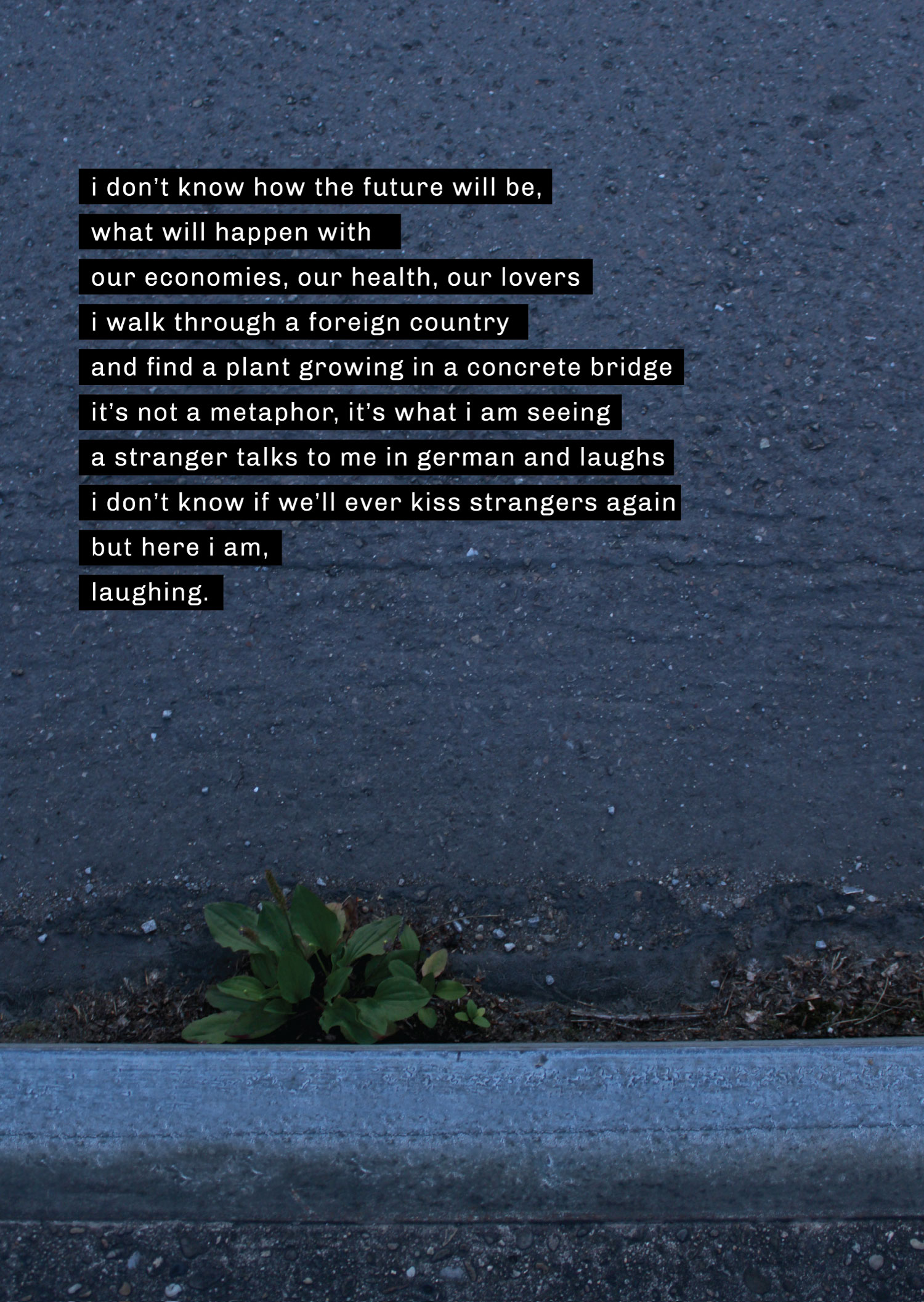
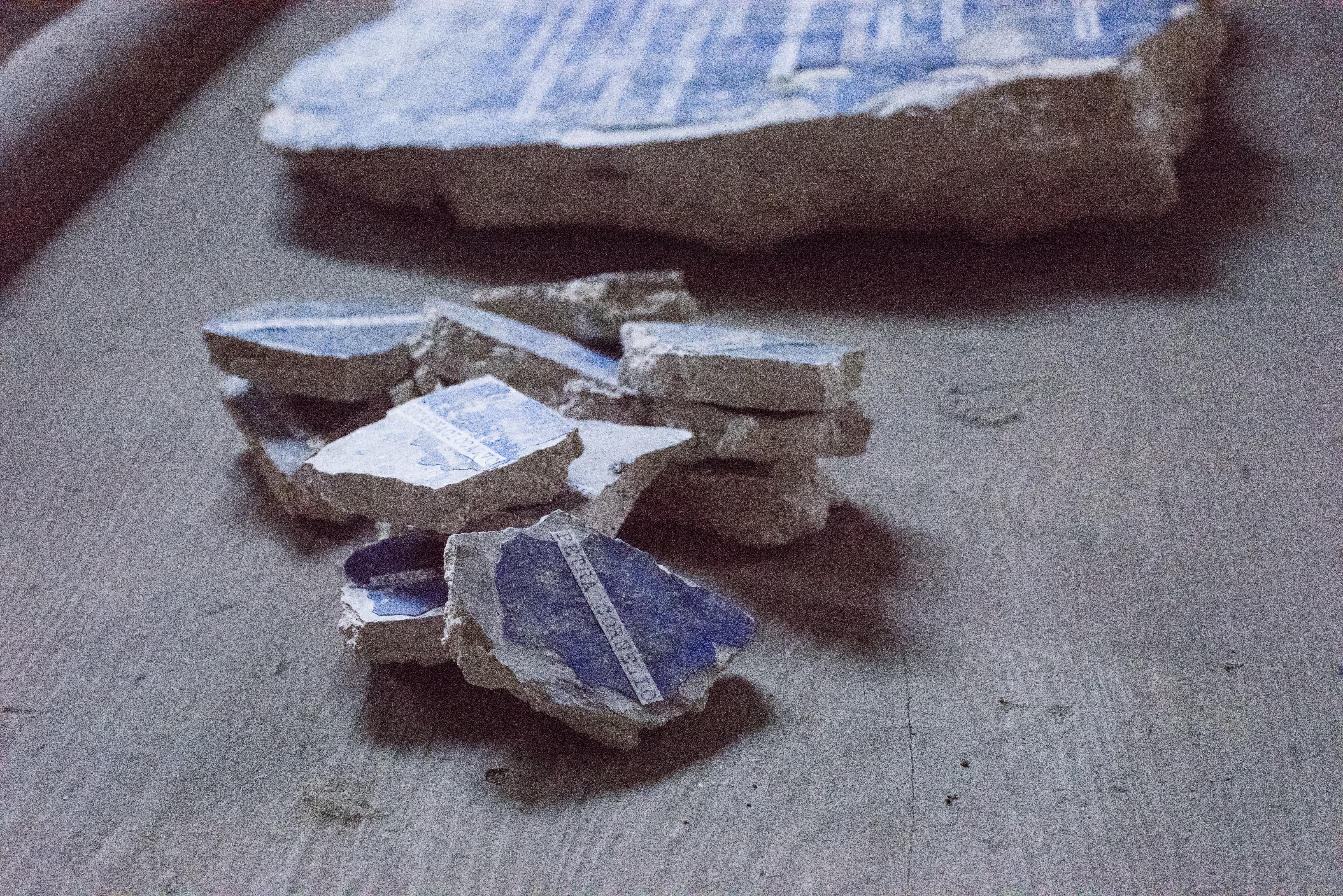
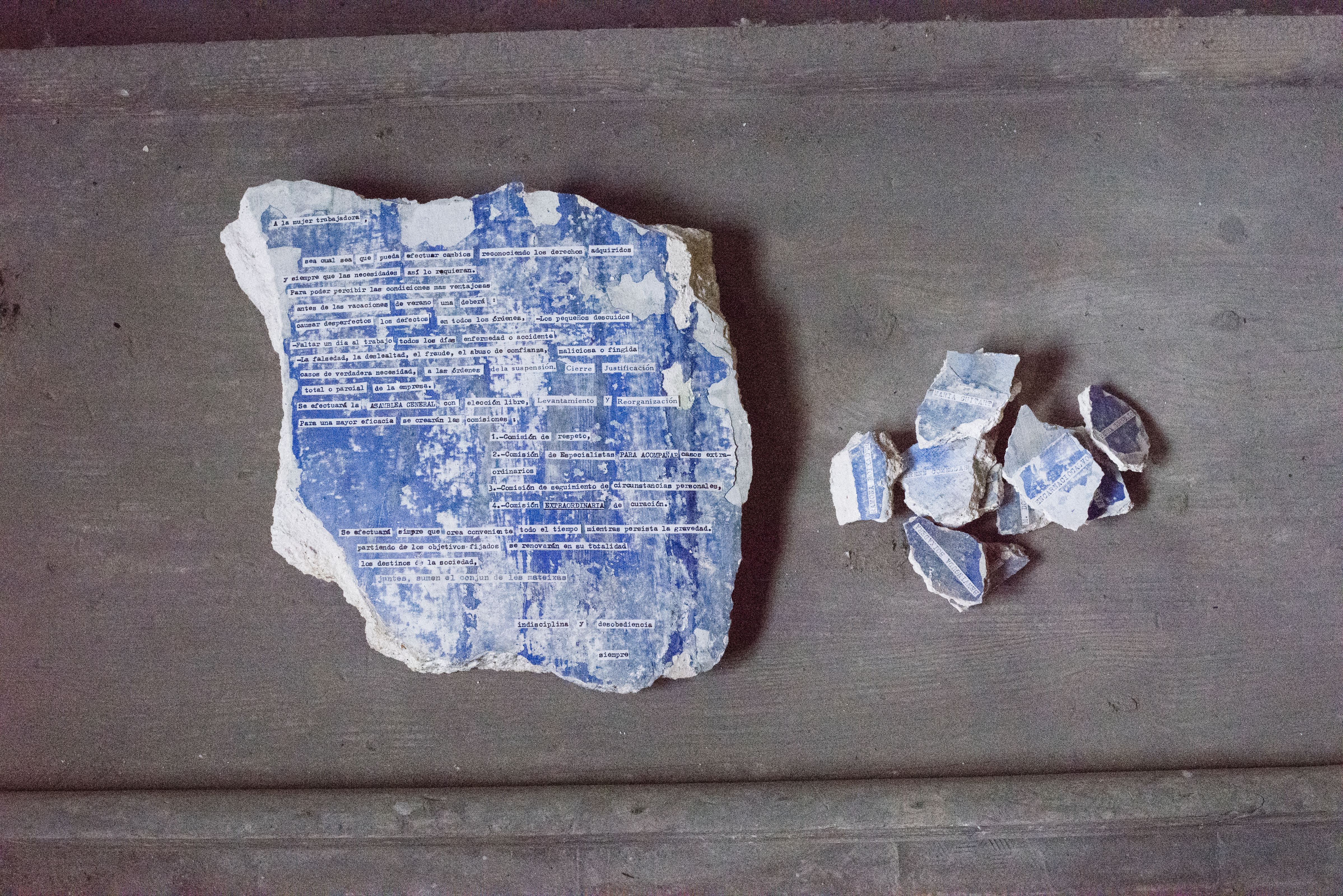
A la mujer trabajadora / Textil Colonia Rosal S.A.
Una pieza realizada desde objetos de la antigua fábrica textil, hoy en día abandonada, trozos de paredes, registros de las trabajadoras y el reglamento interno. El punto de partida fue un apartado del mismo, el único expresado en femenino (por tratarse de maternidad) para escribir una carta expresando un deseo hacia la organización conjunta de las mujeres trabajadoras.
Konvent zero
(Barcelona, 2019)
Una pieza realizada desde objetos de la antigua fábrica textil, hoy en día abandonada, trozos de paredes, registros de las trabajadoras y el reglamento interno. El punto de partida fue un apartado del mismo, el único expresado en femenino (por tratarse de maternidad) para escribir una carta expresando un deseo hacia la organización conjunta de las mujeres trabajadoras.
Konvent zero
(Barcelona, 2019)
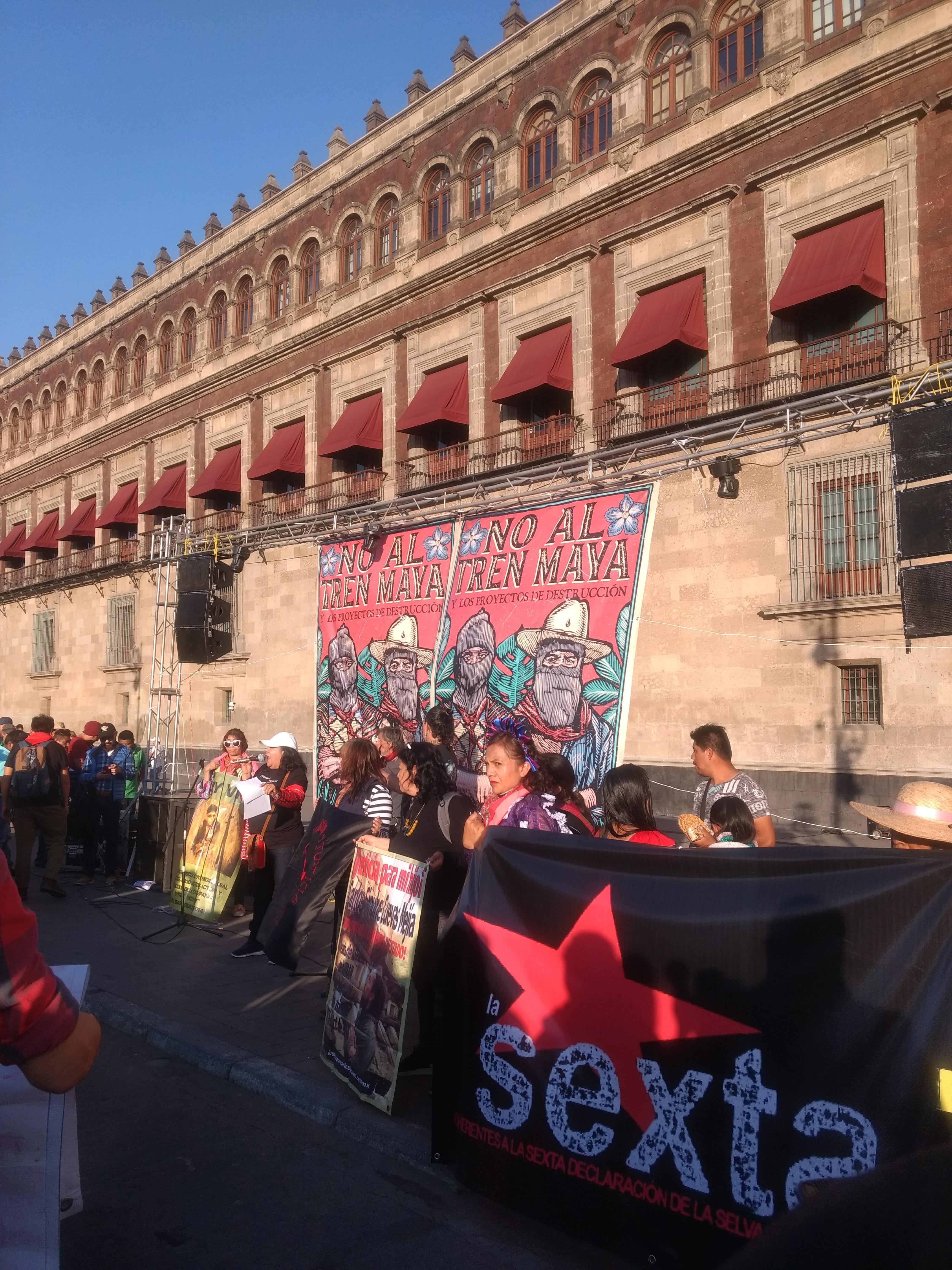
Manifestaciones
Con el apoyo del Ministerio de Cultura de la Nación Argentina
Proyecto de investigación y creación sobre manifestaciones sociales en méxico. Escrito desdeencuentros y entrevistas con organizaciones sociales, instituciones educativas y artistas para pensar las formas en que una manifestación se constituye y desarrolla.
Investigation and creation project about social demonstrations in mexico. Written from meetings and interviews with organisations, educational institutions and artists in the interest of thinking through the ways in which social demonstrations are established and developed.
“Me interesa escribir desde el material que brinda lo real”: entrevista con Giuliana Kiersz, Cartelera de Teatro México
Dejé de saber escribir de a poco, aura, revista de historia y teoría del arte
Con el apoyo del Ministerio de Cultura de la Nación Argentina
Proyecto de investigación y creación sobre manifestaciones sociales en méxico. Escrito desdeencuentros y entrevistas con organizaciones sociales, instituciones educativas y artistas para pensar las formas en que una manifestación se constituye y desarrolla.
Investigation and creation project about social demonstrations in mexico. Written from meetings and interviews with organisations, educational institutions and artists in the interest of thinking through the ways in which social demonstrations are established and developed.
“Me interesa escribir desde el material que brinda lo real”: entrevista con Giuliana Kiersz, Cartelera de Teatro México
Dejé de saber escribir de a poco, aura, revista de historia y teoría del arte
Encuentros de escritura - Writing gatherings
Los Encuentros de escritura son espacios sensibles para reflexionar colectivamente sobre los territorios que habitamos en pos de crear nuevas estructuras narrativas para la sociedad en la que queremos vivir. Investigando la relación con el lenguaje, buscamos expandir la dimensión política de las palabras para percibir más allá de las ideas que tenemos sobre lo existente. la intención es pensar cómo un territorio está en constante cambio y cómo podemos generar contra-narrativas para contarlo y contarnos diferente. Trabajamos de forma empática, en grupos y desde preguntas, dejando contaminar nuestra práctica por el acto de coleccionar, observar y escuchar.
The Writing gatherings are sensitive and political spaces where to reflect collectively on the territories we inhabit to create new narrative structures for the society we want to live in. By investigating our relationship with language, we aim to expand the dimensions of words so as to perceive beyond our ideas of what exists. the intention is to think of how a territory is in constant change and how can we generate counter-narratives to tell it and therefore, tell ourselves, conscious of the social and political dimension this action means. we will use an empathic approach, working in groups and from questions, letting our practice be contaminated by collecting, observing and listening.
Barrio Berlin (Berlin, 2024), Literarischen Colloquium Berlin (Berlin, 2023), T:>Works (Singapore, 2023) (Re) Gaining Ecological Futures, Floating (Berlin, 2021 and 2022), Andenbuch (Berlin, 2022), The curator´s Suitcase, Maxim Gorki Theater (Berlin, 2021), Brussels, city of stories, Muntpunt (Brussels, 2021), Ciudad Escena (Buenos Aires, 2021), Liminoid Encounters, Akademie Schloss Solitude (Stuttgart, 2020), Art University (Tandil, 2019), Maison de l’Argentine (Paris, 2019), Lata peinada (Barcelona, 2019), National Institute of Scenic Arts (Montevideo 2019), Garrison institute (New York, 2018), Women Playwrights International (Santiago de Chile, 2018)
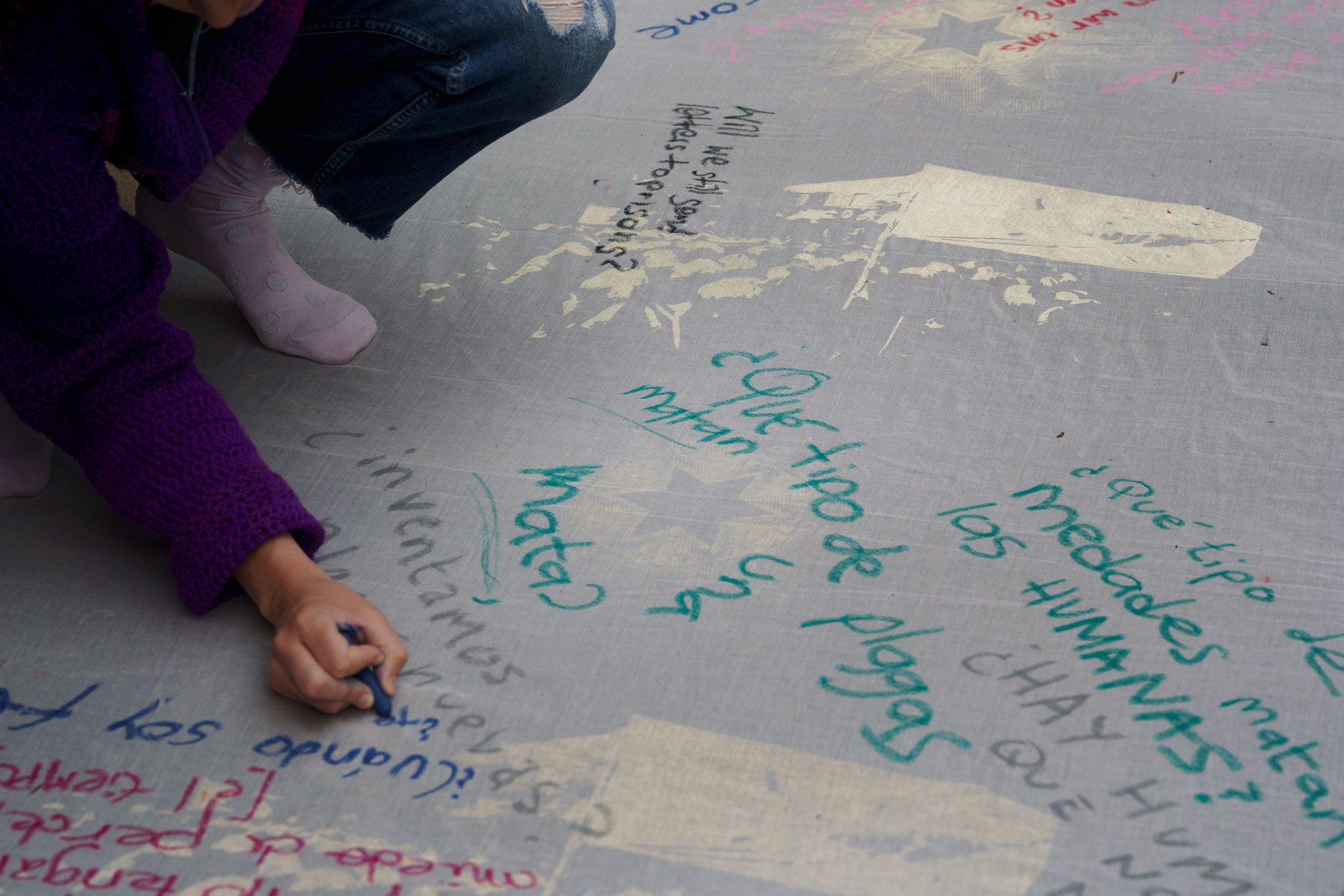
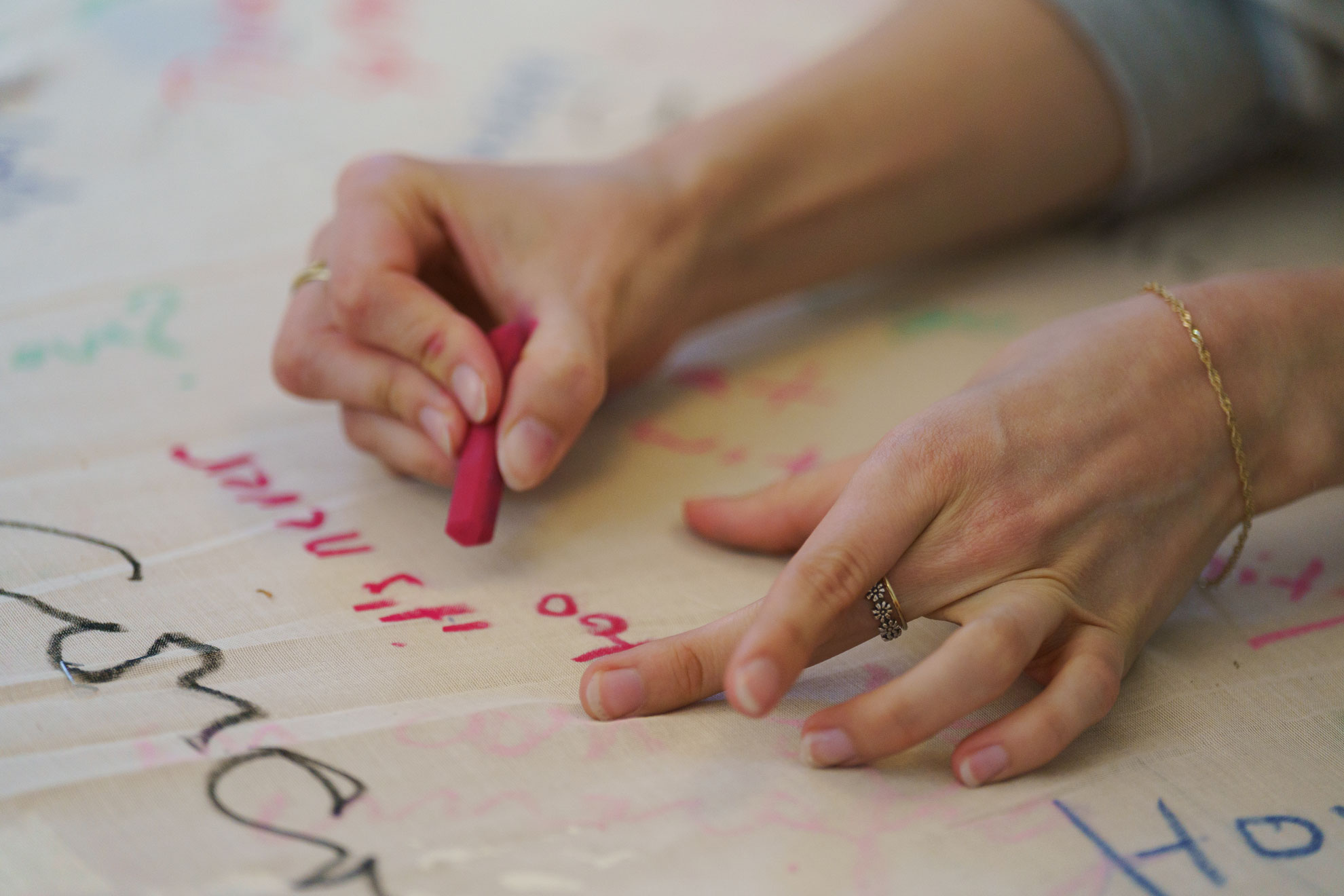


Making a fire out of despair, Assemblage Berlin. 60 Jahre Literatur intermedial, Literarischen Colloquium (Berlin, 2023) Photos: Andrea Huyoff
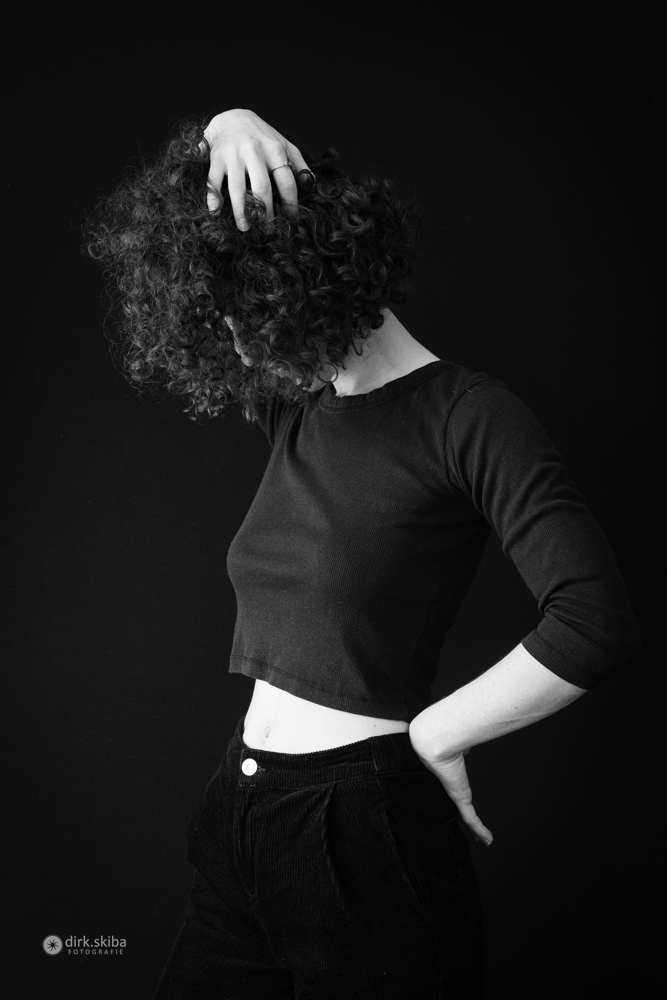
Giuliana Kiersz (1991, Buenos Aires) es escritora, dramaturga y artista. Sus procesos exploran nuestra relación con el lenguaje, reflexionando en contextos específicos para crear fantasías que muevan el horizonte político y social. Crea intervenciones desde la literatura, las artes performáticas y visuales concibiendo la escritura como un acto colectivo para expandir la dimensión política de las palabras. Su obra “Queremos ser nuestros propios líderes” ganó el Premio Estímulo 2024 en dramaturgia, "El fin" obtuvo el X Premio Germán Rozenmacher y fue producida por el Festival Internacional de Buenos Aires en 2019 y festival El Aleph en 2020; "Isabel I", el tercer premio en el XV Concurso Nacional de Dramaturgia del Instituto Nacional de Teatro, cuya editorial la publicó en 2016; y ”B”, "502" y "El día que ella dijo que había matado al perro agarré el auto" obtuvieron premios a la traducción por Maison Antoine Vitez en 2020 y 2021. Su trabajo fue apoyado por varias instituciones internacionales incluyendo Académie du Festival d' Aix, Akademie Schloss Solitude, Maxim Gorki Theater,
Senatsverwaltung für Kultur und Europa, Royal Court Theatre, de Londres, el Ministerio de Cultura de Argentina, el Fondo Metropolitano de la Cultura, las Artes y las Ciencias, la Universidad Veracruzana, el Instituto Nacional de Artes Escénicas de Uruguay, el Festival Internacional de Literatura de Buenos Aires y la Universidad Nacional Autónoma de México. Sus obras fueron exhibidas en galerías y museos como el Kunstmuseum stuttgart y Kastanien Berlin.
Sus textos fueron traducidos al inglés, francés, alemán, búlgaro, portugués y tsotsil y publicados por Rara Avis Editorial, Libros del Rojas, Fondo Editorial ENSAD, Editorial INTeatro, Espejo Somos, Libros Drama, Archive Books / Editions Solitude y Editions Espaces 34. Recientemente ha ganado los concursos Neue Szenen VII de la Deutsche Oper Berlin y Short Operette de Salzkammergut 2024. Actualmente reside en Berlín.
Giuliana Kiersz (1991, Buenos Aires) is a Berlin-based poet, playwright, librettist and artist originally from Buenos Aires. Her methods explore our relationship with language, reflecting within specific contexts to create fantasies that move the social and political horizon. She creates interventions through literature, performance and visual arts, practicing writing as a collective act to expand the political dimension of words. Her play “Queremos ser nuestros propios líderes” won first place in Premio Estímulo 2024 for Playwriting, “El fin” (The end) won first place in the X German
Rozenmacher Prize; “Isabel I” received third prize in the National Theatre Institute’s 15th National
Dramaturgy Competition; and ”B”, "502" and "The day she said that she had killed the dog I took the
car" were awarded with a Maison Antoine Vitez translation price. Her work has been supported by
many international institutions including Akademie Schloss Solitude, Académie du Festival d' Aix, Maxim Gorki Theater,
Senatsverwaltung für Kultur und Europa, London’s Royal Court Theatre, the National Institute of
Scenic Arts in Uruguay (INAE), the Ministry of Culture of Argentina, the International Literature
Festival of Buenos Aires, the National Autonomous University of Mexico (UNAM), the Secretary of
Culture of Mexico and Women Playwrights’ International Conference, among others. Her work has been exhibited in galeries and museums such as Kunstmuseum Stuttgart and Kastanien galerie. Her texts have
been translated into English, German, French, Portuguese, Bulgarian and Tsosil and published by Rara Avis
Editorial, Libros del Rojas, Fondo Editorial ENSAD, Editorial INTeatro, Espejo Somos, Libros Drama
and Solitude Editions / Archive Books and Editions Espaces 34. She recently won the competitions Neue Szenen VII organized by the Deutsche Oper Berlin and Short Operette by Salzkammergut 2024.
